

33 Fun Outdoor Activities for Homeschoolers
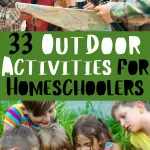
Outdoor activities for homeschoolers are a great way to learn while having fun outside.
The natural world is like a big classroom where kids can explore and discover new things.
Places like parks or even your own backyard are perfect for all sorts of outdoor learning activities. Doing things like science experiments outdoors or playing imaginative games helps kids learn and grow.
These activities are not only enjoyable but also help in learning a lot. Add these to the best homeschooling resources for a well rounded education.
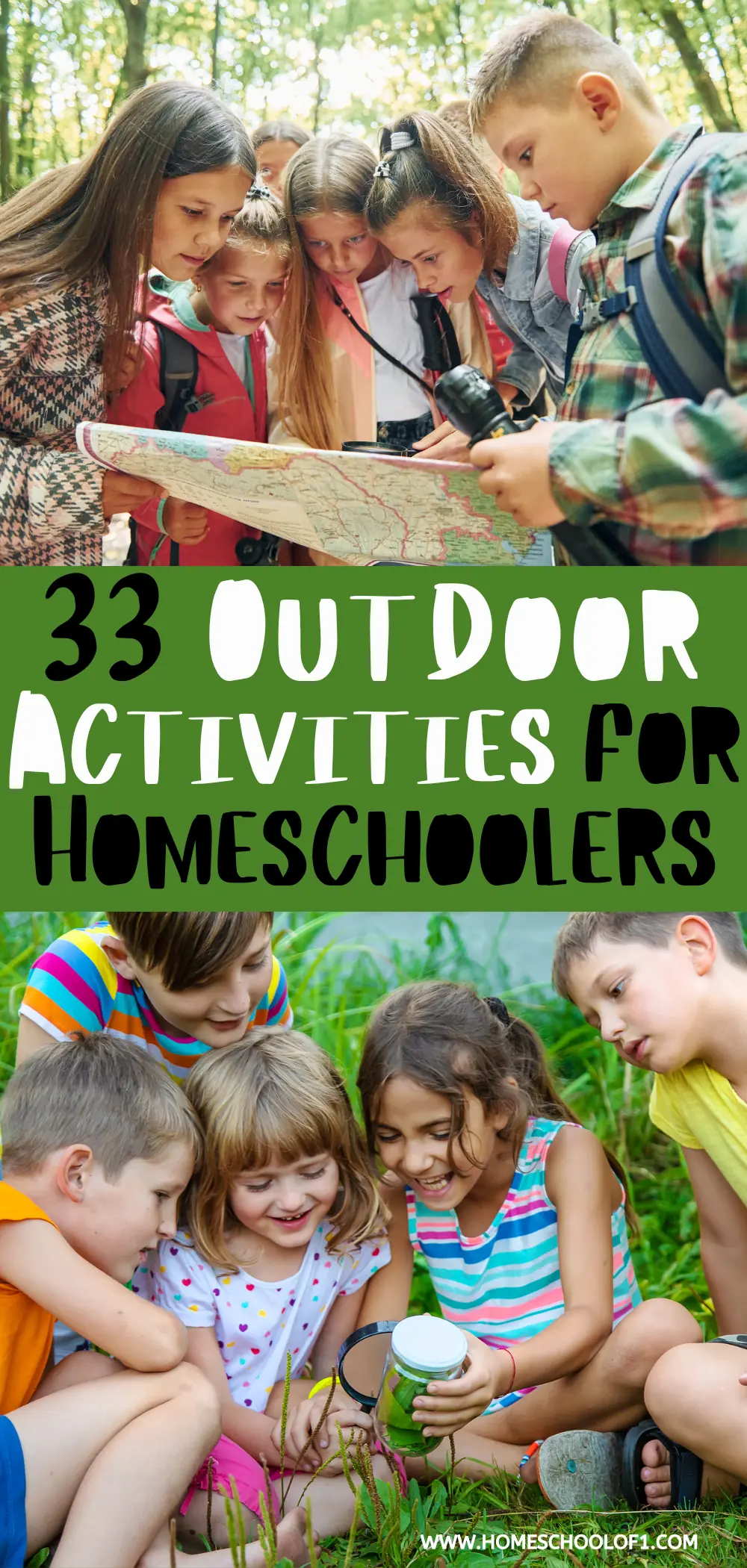
**This post may contain affiliate links. As an Amazon Associate and a participant in other affiliate programs, I earn a commission on qualifying purchases.**
Table of Contents
Outside activities for homeschoolers
Outdoor activities for homeschoolers offer an excellent way to combine education with the joy of being in nature. From physical activities to nature studies, these fun ideas provide a comprehensive guide to outdoor learning.
Homeschooling in the natural environment not only supports academic growth but also fosters creativity, physical health, and social skills.
Embrace these activities for a memorable and enriching homeschooling experience, supplemented by the best homeschooling resources for a complete educational journey!
Nature exploration for homeschool families
Exploring the great outdoors is the best way for young children and older kids to dive into outdoor education.
Nature exploration is a fun way to engage a child’s imagination, especially during a nature walk. For homeschooling parents, these activities present a great opportunity to teach about the natural world in a hands-on learning style.
- Nature Journaling: Encourage kids to document the flora and fauna they encounter in a nature journal.
- Scavenger Hunts: Organize scavenger hunts in a local park to learn about natural elements use our free scavenger hunt printables too!
- Animal Tracks Identification: Use field guides to identify and study animal tracks during nature walks.
- Observing Weather Patterns: Create a mini weather station for tracking local weather conditions.
- Botanical Garden Visits: Explore different plants and ecosystems in a botanical garden.
- Star Gazing: Use star maps to identify constellations and planets in the night sky.
- Bird Watching: Teach children about local bird species and their habits. Use our free types of birds worksheet to identify them.

Outside physical and artistic activities
Physical activity in the fresh air can be a wonderful part of a child’s education.
Combine outdoor adventures with creativity, offering a fun way to keep both young children and teens active and engaged.
From outdoor yoga to rock painting, these activities are perfect for incorporating physical education and artistic skills into your homeschool curriculum.
It’s a great opportunity for homeschooled teens and elementary-age children to express themselves creatively in the outdoor learning environment. Making the most of the school year.
These fun activities are an easy way to add excitement to your homeschooling routine.
- Outdoor Yoga: Practice yoga in the fresh air to enhance physical and mental health.
- Nature-inspired Art Projects: Collect natural materials for creating earth art and other artistic expressions.
- Outdoor Sports: Engage in sports like frisbee or soccer for physical education.
- Hiking and Trekking: Explore national parks and trails to build endurance and appreciate nature.
- Gardening activities : Cultivate a small space garden, learning about plants and responsibility.
- Photography: Capture the beauty of the natural surroundings through photography.
- Rock Painting: Find large rocks for creative painting and decoration.
Have fun with our garden scavenger hunt printable !
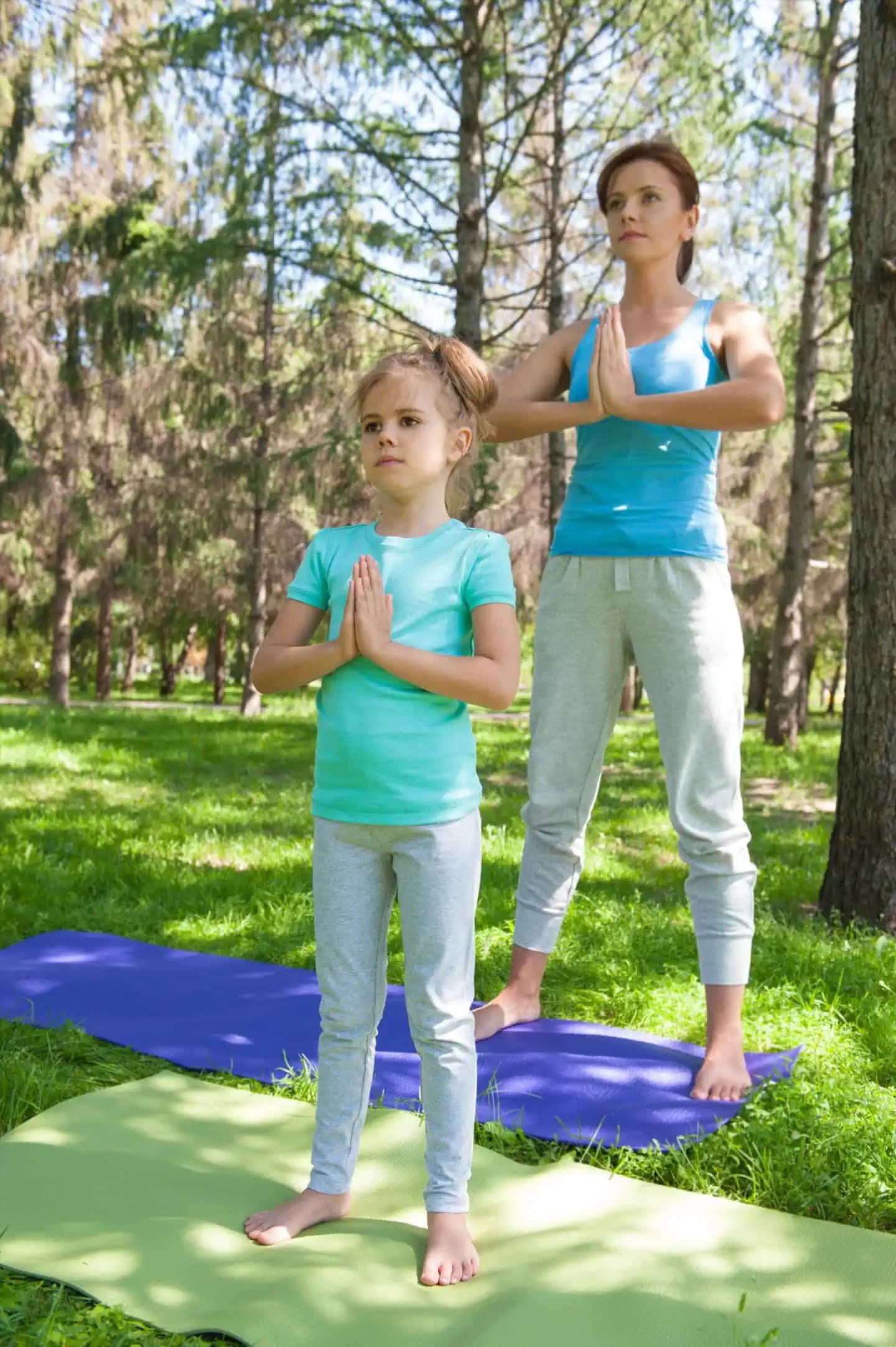
Outdoor educational homeschool activities
The outdoor environment is a fantastic classroom, providing a rich learning experience through educational and interactive activities.
From field trips to local museums to wildlife observation, these activities are a perfect way to enhance the educational experience of homeschooled children.
Whether it’s building simple structures or participating in local cleanup. Each activity is a helpful tip for incorporating valuable life lessons into the outdoor learning environment. Suitable for both younger kids and high school students.

- Field Trips to Museums: Visit local museums or historical sites for a mix of education and fun.
- Nature Study Sessions: Organize group learning sessions in outdoor environments.
- Building Simple Structures: Use natural materials to build small structures, enhancing problem-solving skills.
- Map Reading and Navigation: Practice navigation skills during hikes or nature walks.
- Participating in Local Cleanup: Join community efforts in local parks or beaches for environmental education.
- Outdoor Science Experiments: Conduct simple experiments to understand natural phenomena.
- Wildlife Observation: Visit a nature center or sanctuary to learn about local wildlife.
Download our free museum scavenger hunt printable !
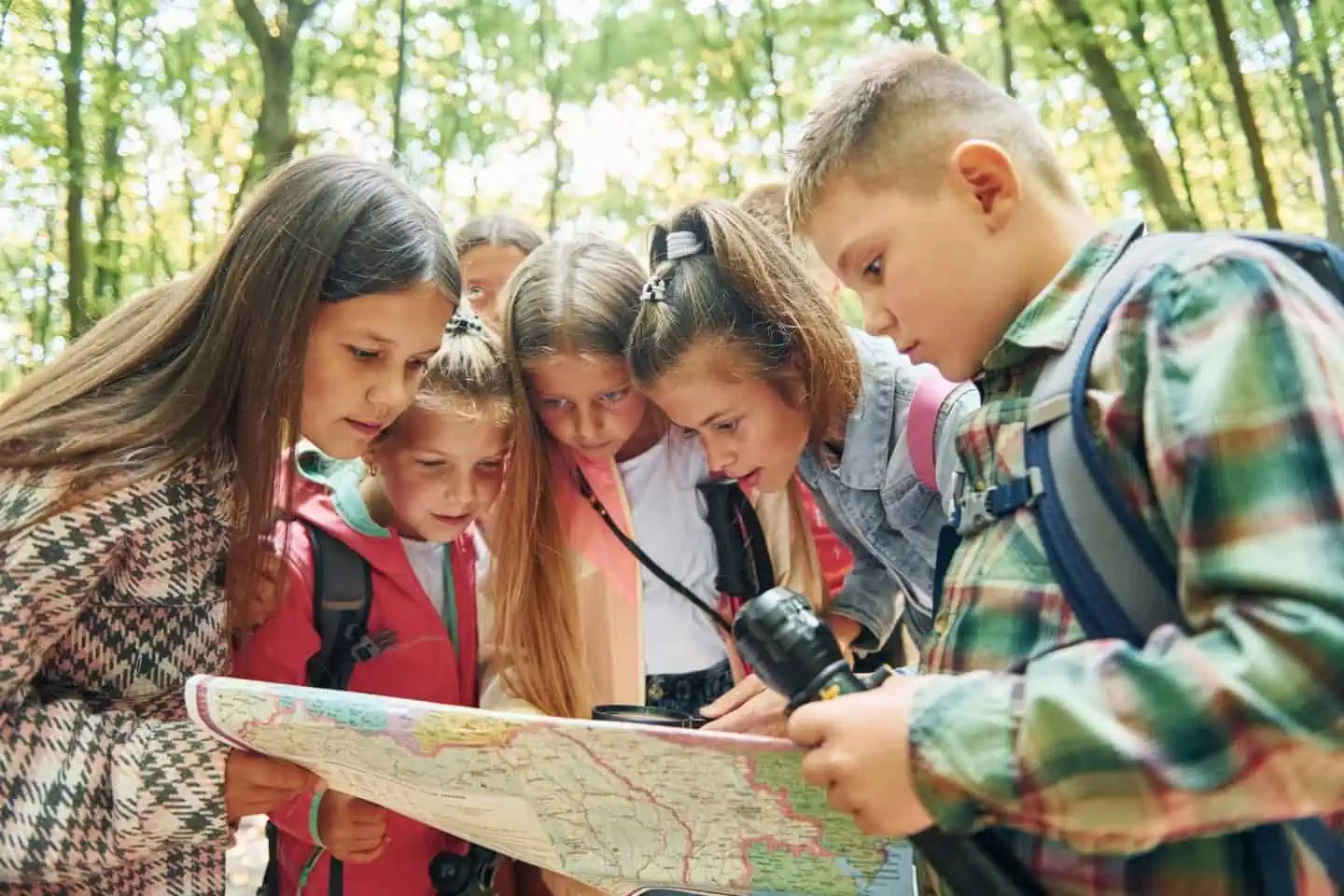
Outdoor social activities for homeschoolers
Engaging in social and community activities is a vital aspect of outdoor education, especially for homeschooled children.
This section provides great ideas for outdoor activities that promote social skills and community involvement.
From joining nature clubs to volunteering at food banks, these activities offer homeschooled teens and younger kids the chance to spend quality time with peers and contribute to their community.
It’s a fun way to learn important life skills and build relationships outside the confines of traditional schools.
These extracurricular activities are an excellent way for homeschooling parents to expand their lesson plans and provide a more holistic educational experience.
- Joining or Forming Nature Clubs: Connect with other homeschoolers for group activities.
- Volunteering at Community Gardens: Help in community gardens to learn about plants and give back.
- Participating in Local Events: Engage in local events and festivals to learn about different cultures.
- Outdoor Book Clubs: Organize book reading sessions in a local park or coffee shop.
- Support Group Meetups: Attend or organize meetups with other homeschooling families.
- Collaborative Art Projects: Work on group art projects using natural objects for artistic expression.
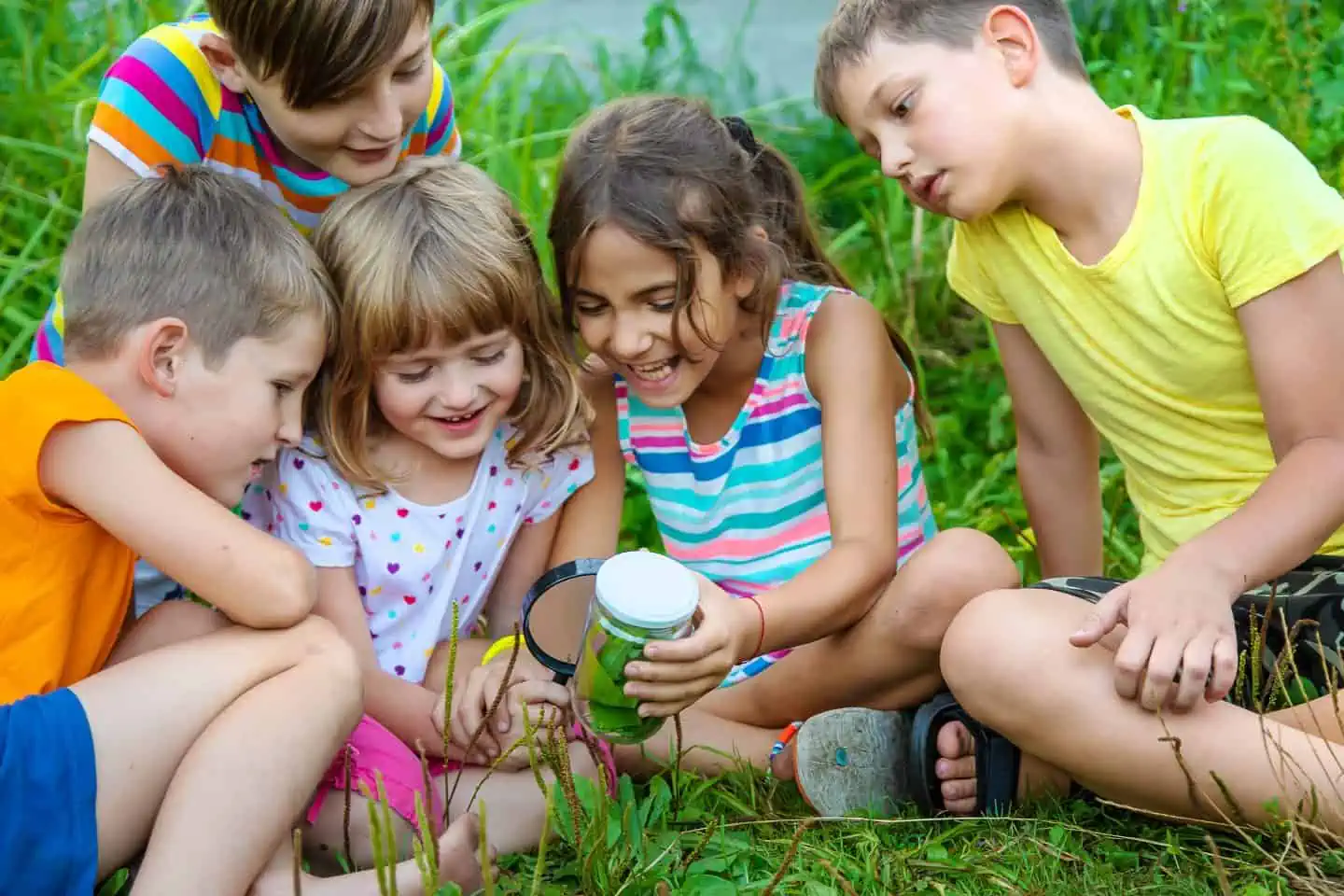
Seasonal and weather-dependent homeschool activities
Every time of year, whether it’s the heat of summer or the chill of snow days, offers unique opportunities for outdoor learning.
This section focuses on seasonal and weather-dependent activities, perfect for making the most of the outdoor environment no matter the weather conditions.
From enjoying the beauty of nature on rainy days to engaging in winter sports on snow days. These activities are designed to provide a lot of fun while teaching valuable lessons.
They’re a simple way to ensure children of all ages get outdoor time. And a great place for homeschooling parents to find additional resources for their outdoor learning plans.
- Snow Day Activities: Build snowmen, go sledding, or have snowball fights on snowy days.
- Rainy Day Walks: Experience nature in different weather conditions with rainy walks.
- Spring Nature Walks: Observe the changes in nature and local plants as seasons change.
- Summer Water Activities: Engage in water sports or activities at a nearby beach or lake.
- Fall Leaf Collection: Collect and study different types of leaves during autumn.
- Winter Bird Feeding: Set up bird feeders and learn about birds that stay during winter.
Check out even more fun homeschool activities for kindergarten !
Last Updated on 12 August 2024 by Clare Brown
Leave a Reply Cancel reply
Your email address will not be published. Required fields are marked *
- Skip to primary navigation
- Skip to main content
- Skip to primary sidebar
Teaching Expertise
- Classroom Ideas
- Teacher’s Life
- Deals & Shopping
- Privacy Policy
62 Outdoor Activity Ideas For Elementary Students: Exploring The Sidewalk And The Nature
October 17, 2023 // by Eileen Zajac
There’s no doubt that outdoor activities are some of the best memories I have as a kid. If that’s the same case for you, then you’re probably constantly trying to find different kids’ activities for your classroom, backyard, or an upcoming party.
This list of 40 outdoor activities for kids will help you find outdoor learning activities to enhance your students’ and kiddos’ experiences. So, use these examples for some outdoor playtime with your elementary-aged kids and enjoy!
1. Never too old for sidewalk chalk
Kids are never too old for some sidewalk chalk! It’s important to always have some lying around in the classroom and at home. Get kids excited to play outside by supplying different drawing challenges or playground games that can be drawn with chalk.
Learn More: Teach with the Doolhouse Collector
2. Outdoor Multiplication
Outdoor education activities revolving around math can really be adapted to any grade. This activity specifically can be used for any of the math operations. In elementary, we use this primarily for multiplication and division fact families.
Use dice and some natural materials to create different equations.
Learn More: Pearls and Wisdom
3. Lunch with the teacher
Getting outside for a few minutes daily has been known to reduce stress. It’s important to get some fresh air and enjoy the sunny days. Eating lunch with the teacher is always a treat, but bringing your kiddos outdoors is a whole new experience for everyone.
Learn More: United Christian Academy Thunder
4. Nature Activity for Kids
I love having fun in nature with my kiddos. At literally any age, they will love creating different art pieces with the nature they can find. Provide students with a theme and let them free outdoors and see what type of pictures they can come up with.
Learn More: Inspire My Play
5. Outdoor Learning | Habitats
Do you have a habitat unit? Throughout elementary school, students are always learning about different habitats and how animals evolve and live in these spaces. Turn your picture sorts and other classic activities into outdoor playtime! Have students create and talk about different habitats that animals would be able to survive in.
Learn More: For Kids Only Afterschool
6. Fairy Doors
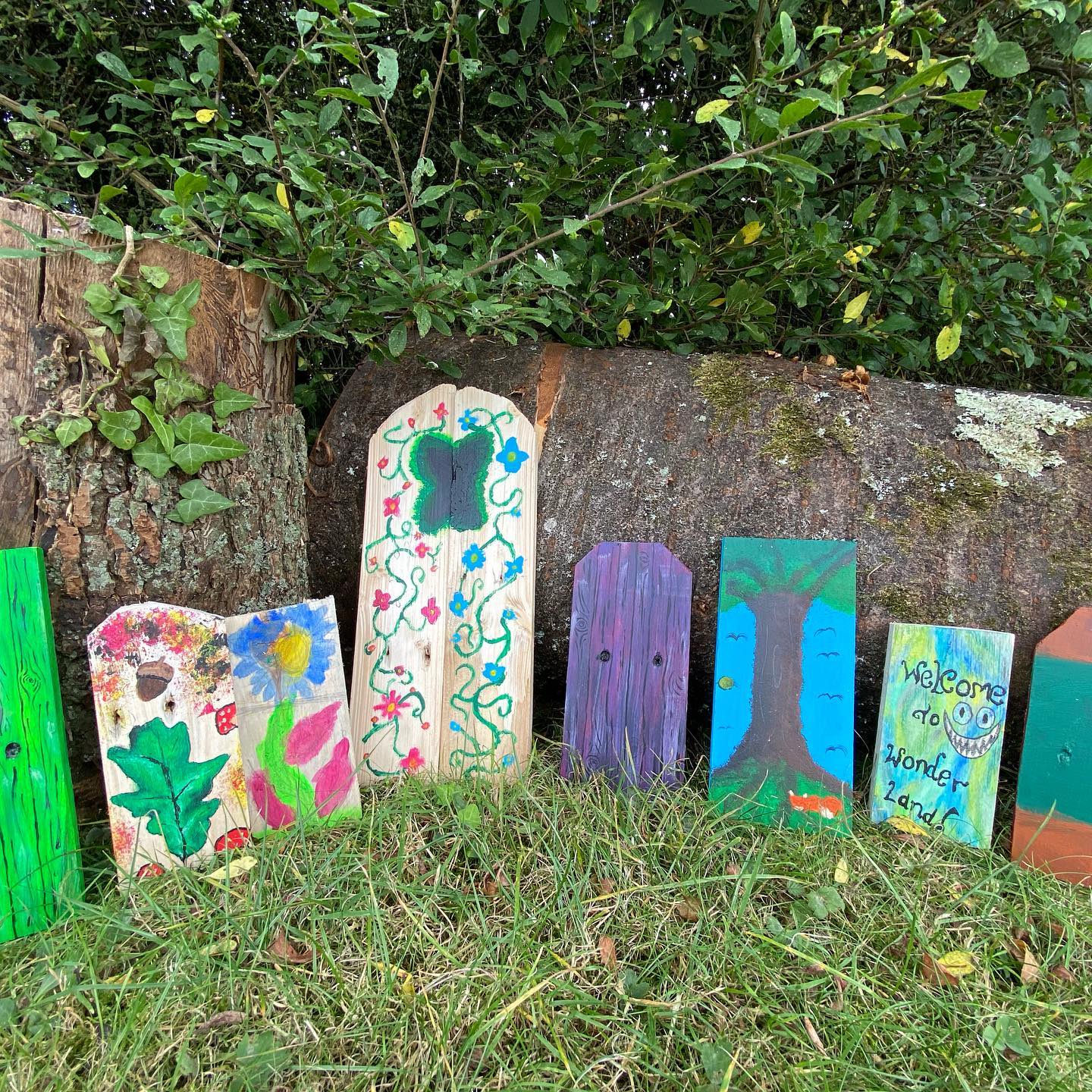
Anything is possible with some acrylic paint, canvas, or even some old wood. My students absolutely LOVE painting fairy doors in creative ways, filled with beautiful colors. Tie these doors in with a fairy story and watch as students use their observation skills to create adequate fairy spaces.
Learn More: Willow Banks
7. Christmas in Leaves
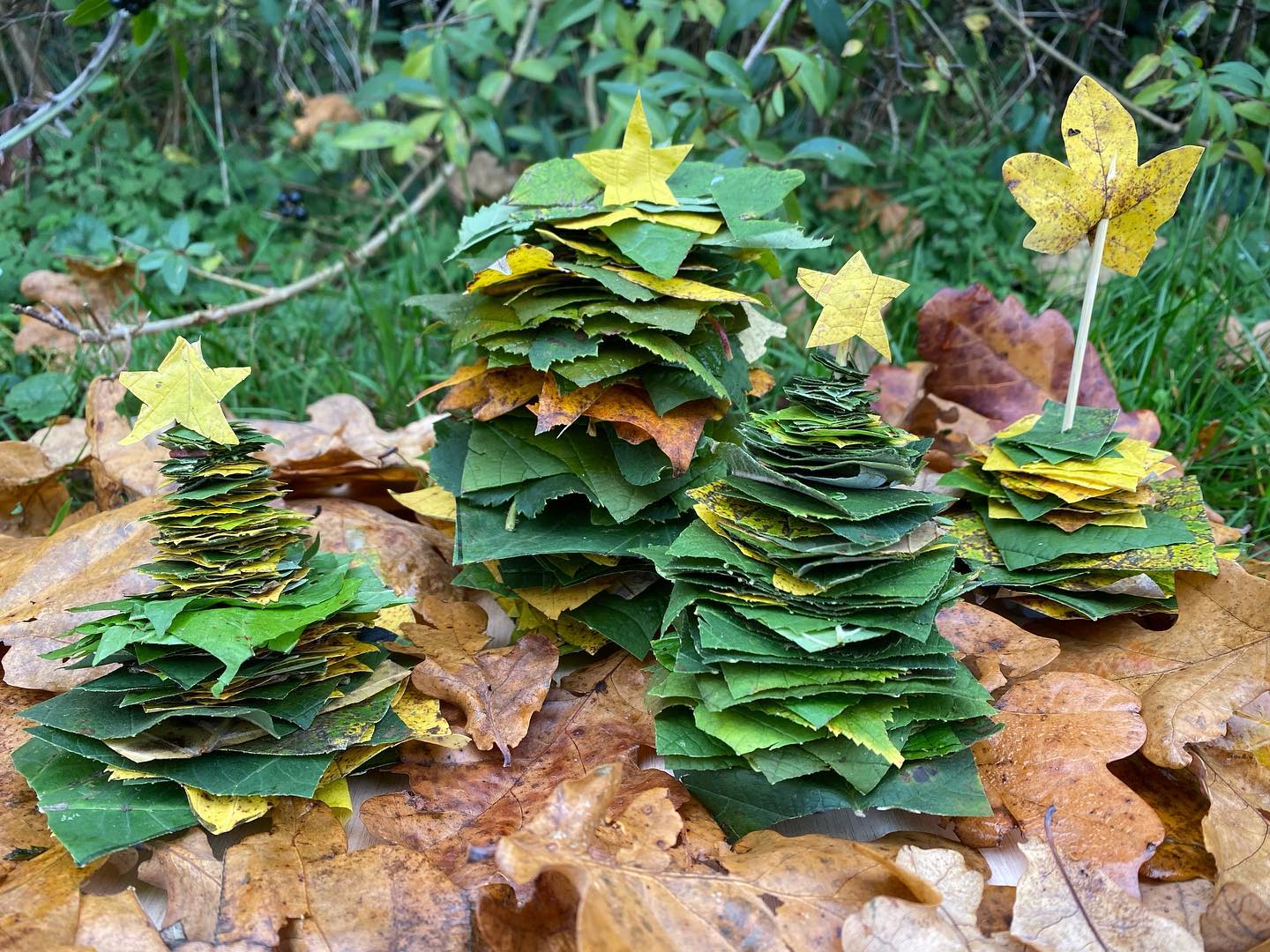
If you live somewhere warm around the holidays, then creating different art structures out of leaves is a great way to celebrate! here is an example of adorable leaf Christmas trees, but you could also create wreaths, kissing balls, and more using natural materials from right in your backyard.
8. Remembrance Day Outdoor Simple Activity
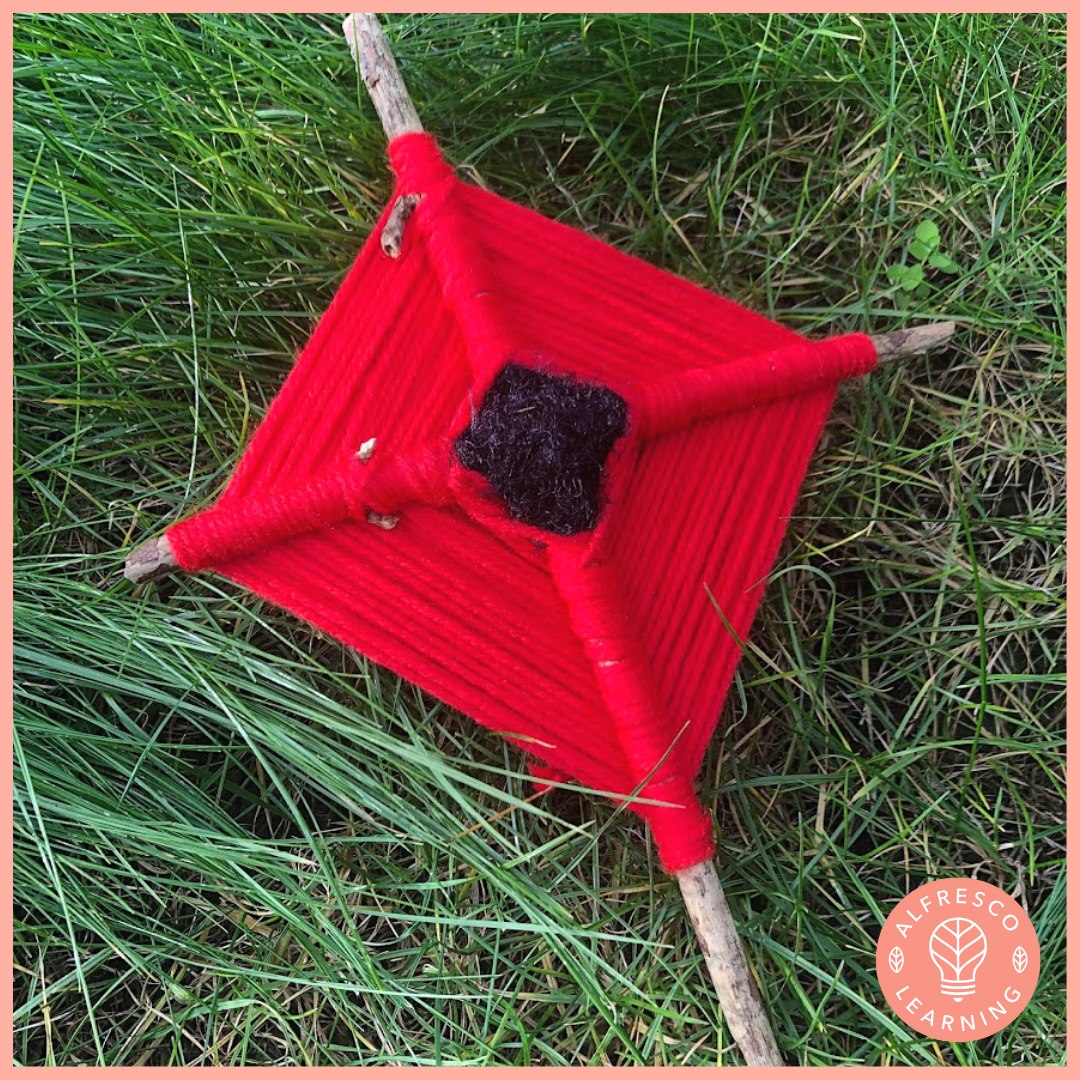
You can create this perfect remembrance day craft with a couple of sticks and some red string. Although it may not be a super fun game, add it to your list of outdoor learning activities and watch as your students just love the idea of being outside in the warmth rather than being stuck inside the classroom.
Learn More: Alfresco Learning
9. Perfect Activity for Your Next Sound Unit
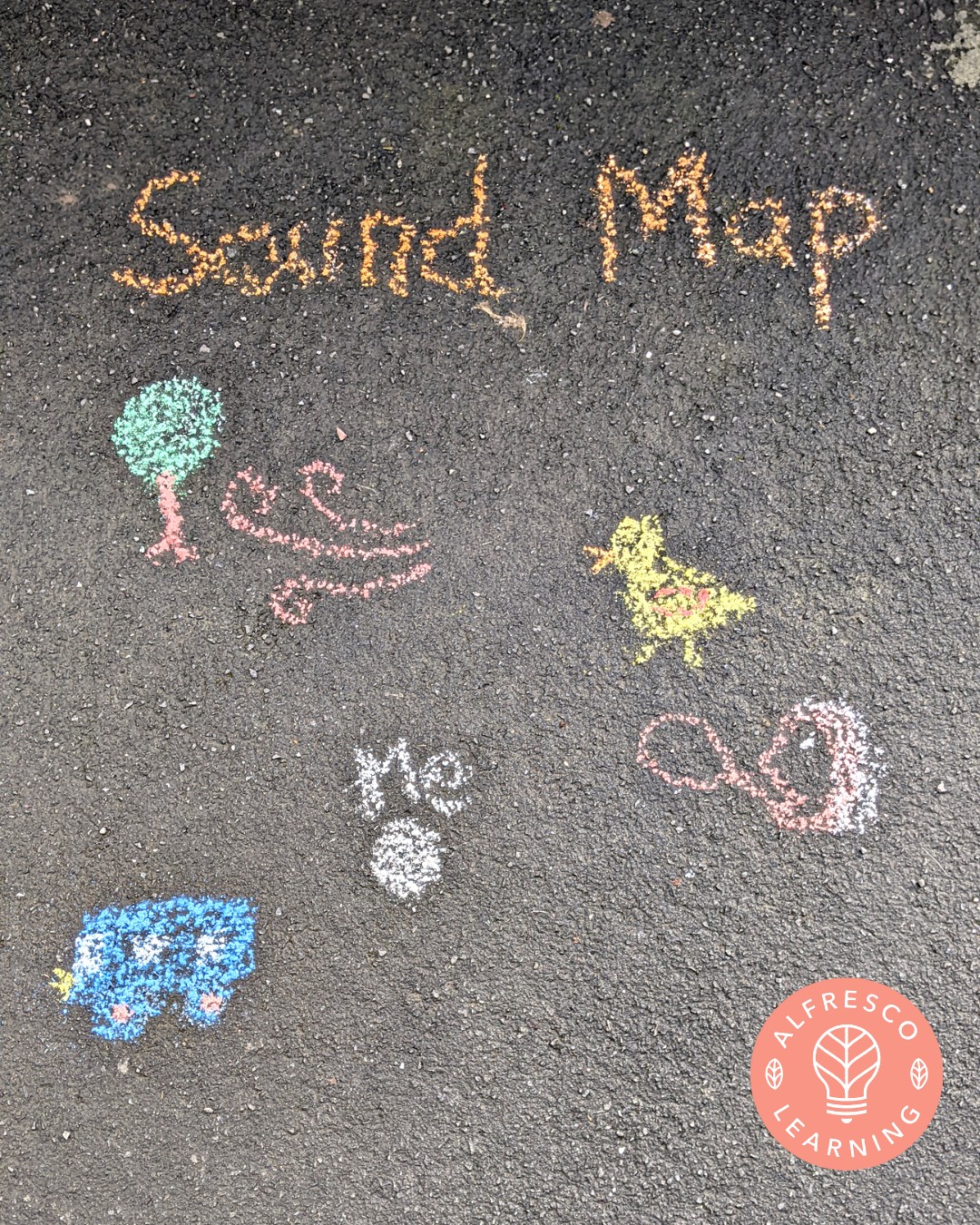
This is the perfect activity for spring. After being trapped inside for a long, drawn-out, cold winter, your students will love to get out and listen to all the different sounds that come with spring. Allow student groups (or a whole class) to create a sound map at the playground or basketball court.
10. Create a Wishing Tree
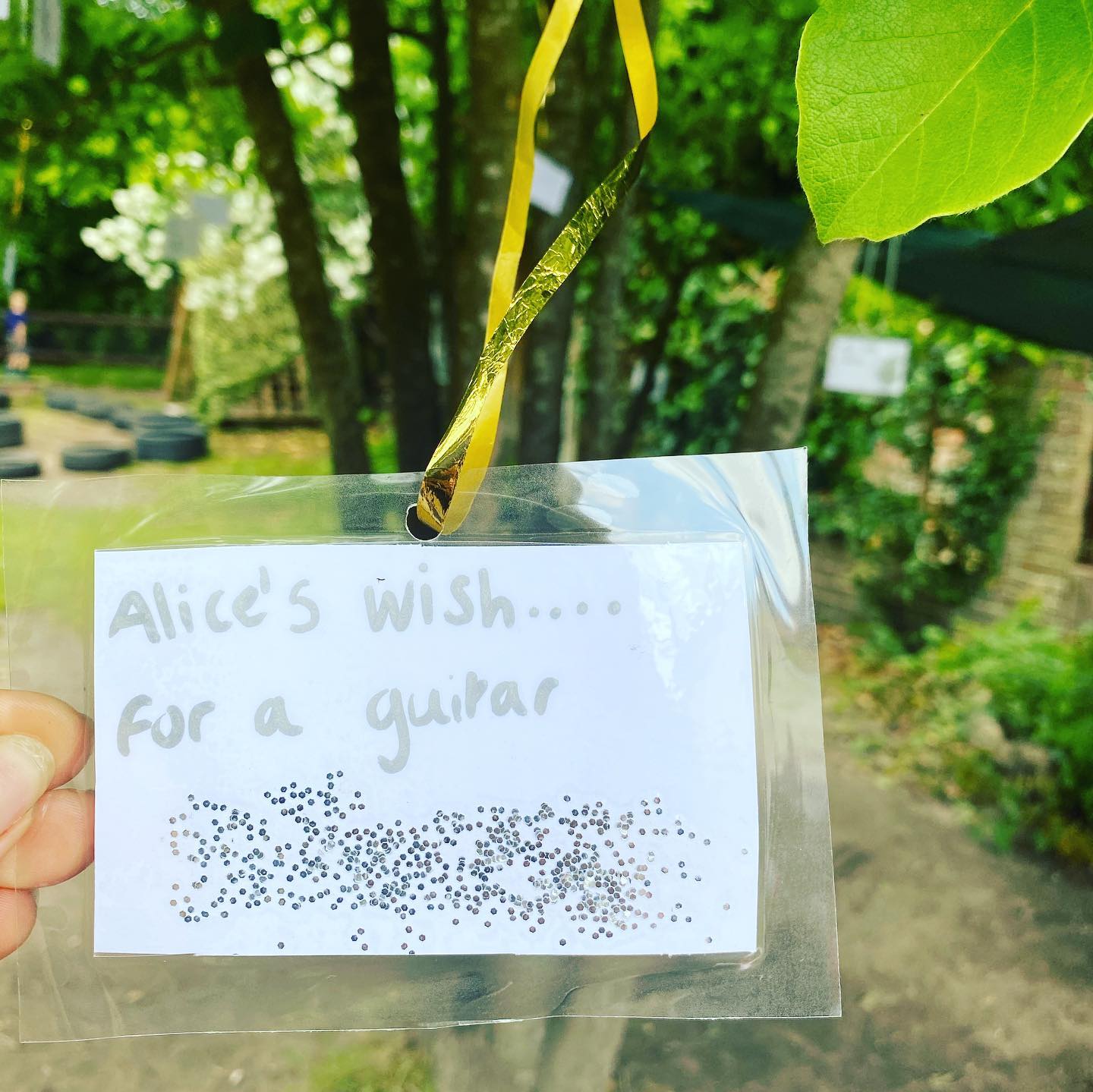
I love this idea for a school. It’s one of those outdoor kids’ activities that can be used for years to come. Creating a wishing tree is both simple and totally worth it. Have students make wishes, laminate them (to protect them from the weather), and tie them onto the trees!
Definitely check with your school first and may have a full-on assembly, donating one tree specifically to serve the purpose of the school’s wishing tree.
Learn More: Abbotswood Pre-School and Day Nursery
11. Place Value Scavenger Hunt
This game can be created with a piece of paper, a permanent marker, and some scissors. It’s so easy, and your students will absolutely love the outdoor game aspect. Whichever area of place value you’re studying, use it as a guide to get students to match the numbers on their papers to the numbers throughout the scavenger hunt.
12. Rainbow Leaves
If you’re just trying to find outdoor learning activities that will give your students a little brain break, this color recognition activity is perfect for beautiful autumn days. Have students collect all the different colored leaves they can and create their own rainbow out of natural materials.
Learn More: Play of the Wild
13. Rocks + String = Shape Learning
Have you taught your shape lessons outdoors yet?
Honestly, this is one of those outdoor learning activities you’ll be using yearly. The best news is that even on rainy days, you can still complete this activity indoors (sadly). It’s perfect for building hand-eye coordination as well as knowledge of creating different shapes.
14. Bucket Relay
If you’re looking for some water play for the exceptionally hot days coming up this summer, then this might just be one of your best outdoor activities yet. It’s challenging but also very engaging and promotes a pretty high level of teamwork.
Simply have a tub or bucket of water ready for your kiddos and have them work together to transfer the bucket to the other side. Whoever gets it there first wins!
Learn More: 26th Cospicua Girl Guides
15. Bucket Drumming
Looking for outdoor kids’ activities for music class? No worries! This is a perfect activity for your drumming unit. Plan it for a time when the weather is nice, and you can easily get your kiddos outdoors. They’ll love being out and about drumming away.
Learn More: Bandology
16. Painting with Water Guns
Skip the water fight this year and instead paint with that beautiful, colorful water stream. Students can fill their water guns with the colorful water that’s already in the buckets! Hang a large piece of paper on the wall and let your kiddos go crazy. Or use chalk paint, and then it will wash off.
Learn More: Oxford Schools
17. Jump Rope Songs
Jump rope is a classic outdoor game dating all the way back to the 1600s! That’s a long time, and we’ve also come a long way since then. Print off and laminate jump rope songs for your students. They’ll love learning them, and the more songs, the more hours of fun!
Learn More: Kodaly Inspired Classroom
18. Paper Plate Memory Game
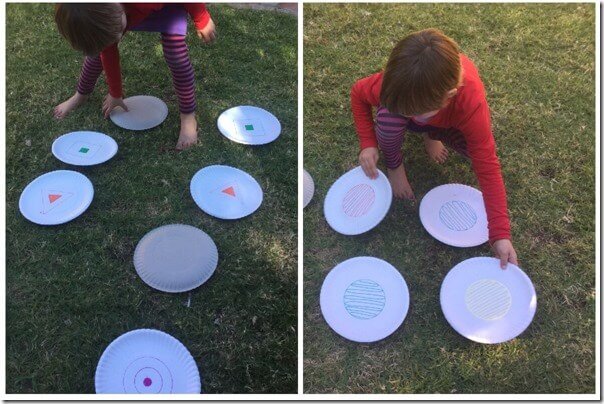
Increase students’ visual observation skills with a simple memory game! Using paper plates and some markers, you can easily manipulate this memory game to fit anything you’re teaching. Be it math equations, vocabulary review, or shape matching; you can literally create anything!
Learn More: 123Homeschool4me
19. Balancing Ball Backyard Party
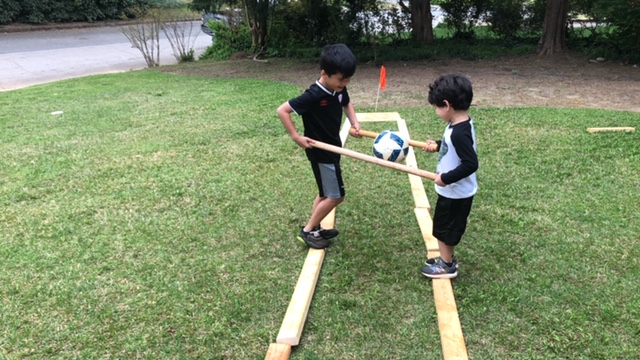
Get your kids to practice with some active movements. This game is challenging to work on all their motor and concentration skills. But it’s the best kind of challenge. Your students will love the friendly competition with other classmates.
Learn More: Learn As You Play
20. Hula Hoop Pass
Looking for a team-building outdoor game? This is it!
Can your entire class pass the hula hoop? There are so many variations to how this game can be played; here are some examples:
- Time it and see if you can get faster with practice
- Split the class into two and see who can get it across the fastest
- Challenge another class
Learn More: A Girl and a Glue Gun
21. Capture the Cones
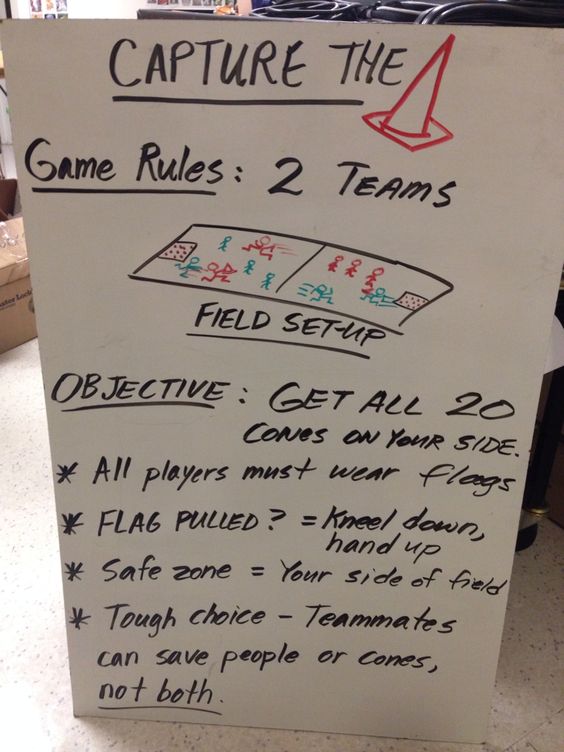
Capture the cones. Yes, this is a phys ed game, but it is an active game that can be played anywhere. It’s perfect for students who just need a little break but may need to practice their sportsmanship skills.
Learn More: Wes Snowalker
22. The Rabbit Hole Game
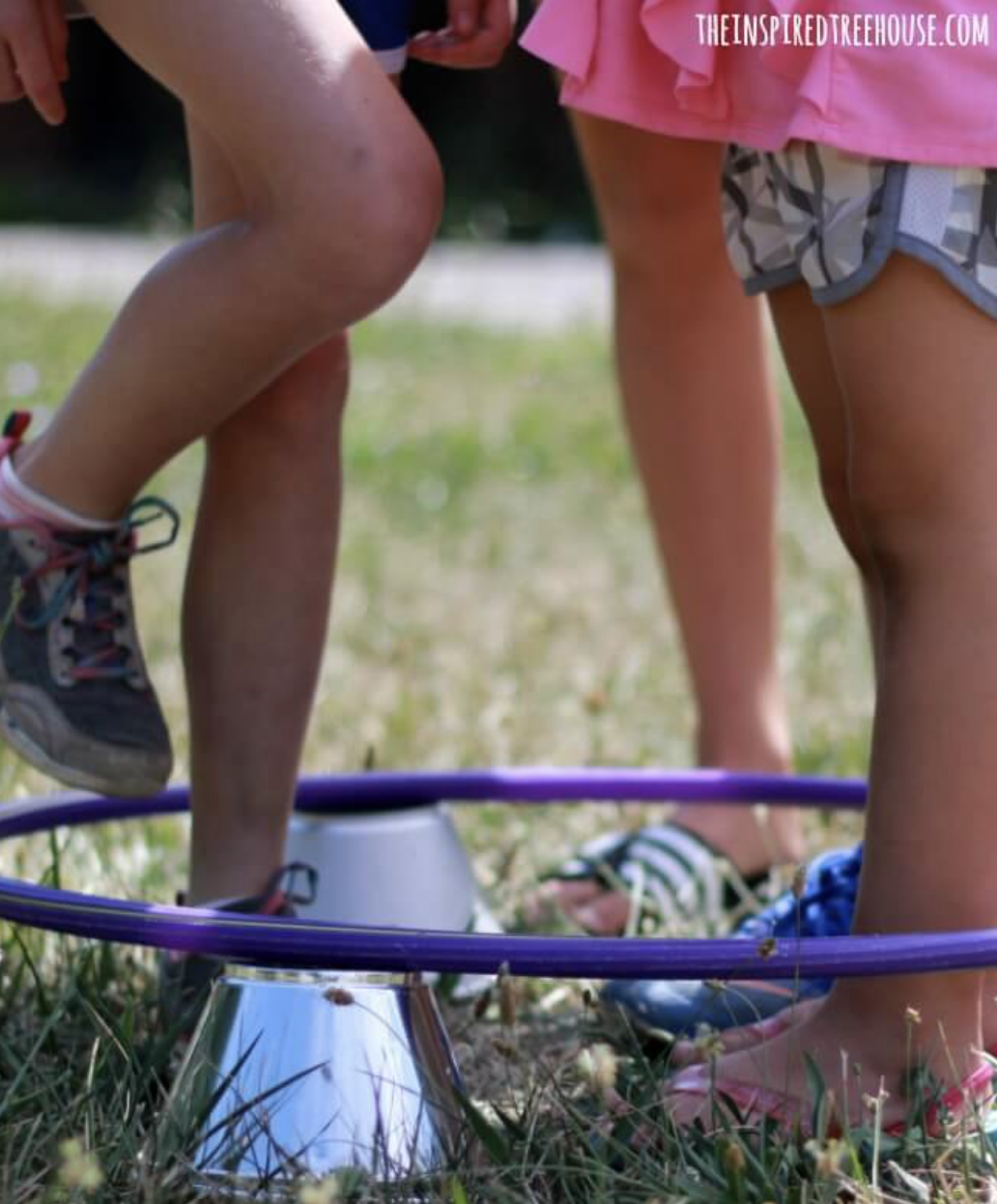
Add this to your outdoor game list for sure. If your students are constantly struggling to find games for recess, then set up the rabbit hole game somewhere in the playground. Students will love playing. It’s also a great game for some backyard family fun.
Learn More: The Inspired Tree House
23. Hungry, Hungry, Hippos
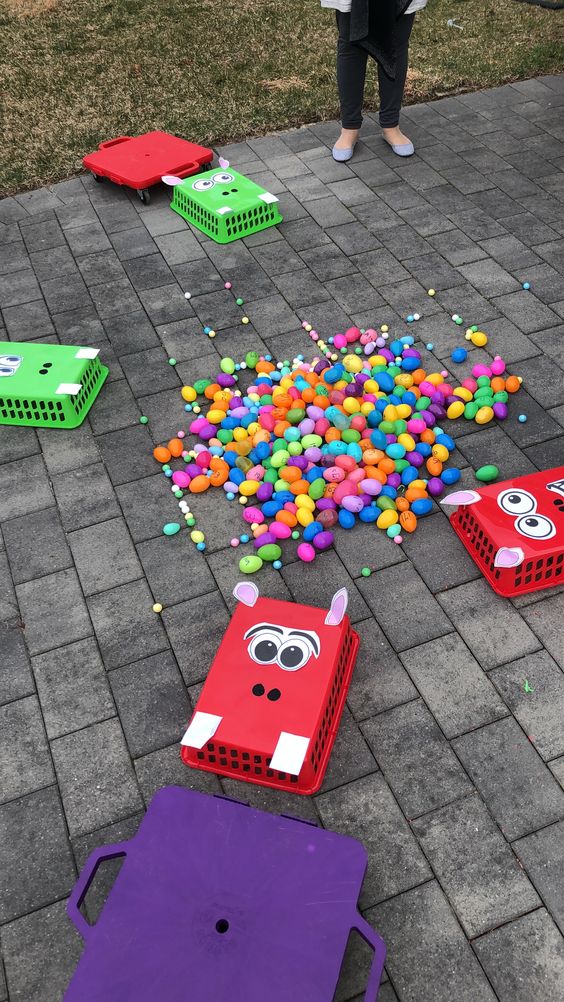
Real-life Hungry Hungry Hippos is ALWAYS a favorite. Save your Easter eggs, use balls from an old ball pit, or buy some new ones! This game can be as creative or as basic as you want. Either way, students are going to have a blast playing! If you don’t have scooters , then skateboards will work as well.
Learn More: Pinterest
24. Backyard Measuring
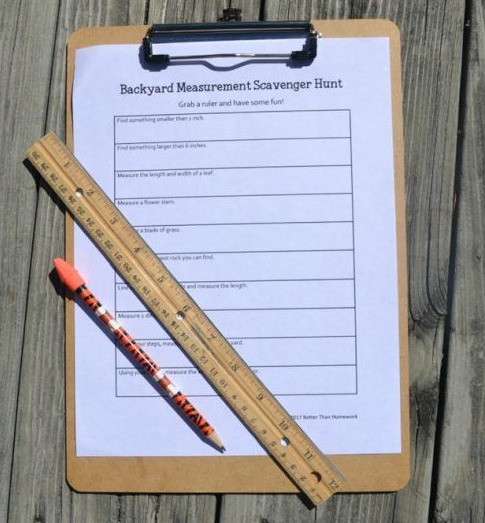
Practicing measurements? Take it outside!
This measure backyard scavenger hunt checklist is perfect for any unit on measurements. No matter the metrics being used, your students will love finding different objects throughout the backyard and measuring and recording.
Learn More: Creative Family Fun
25. Trail Marking Scavenger Hunt
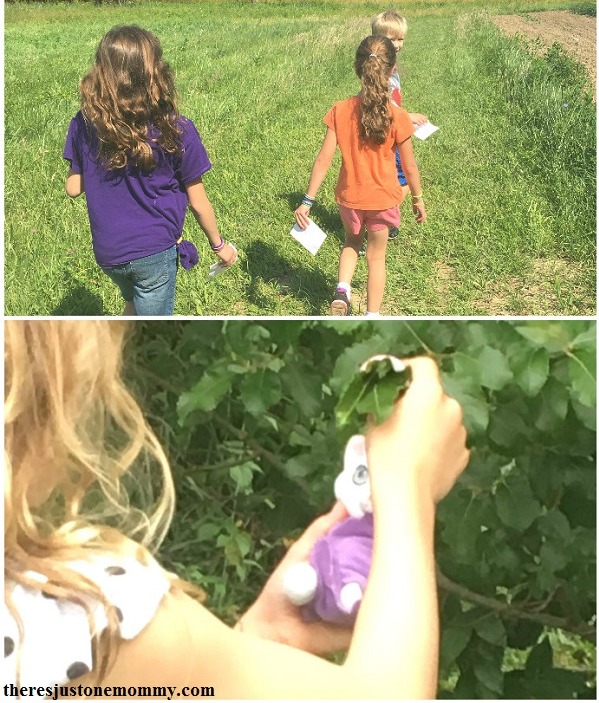
Take your kiddos out on a little trail hike. Teach them about marking trails so that you can find your way back. There are so many different ways and objects that can be used to mark trails:
- And many more!
Learn More: There’s Just One Mommy
26. Compass Directions Game
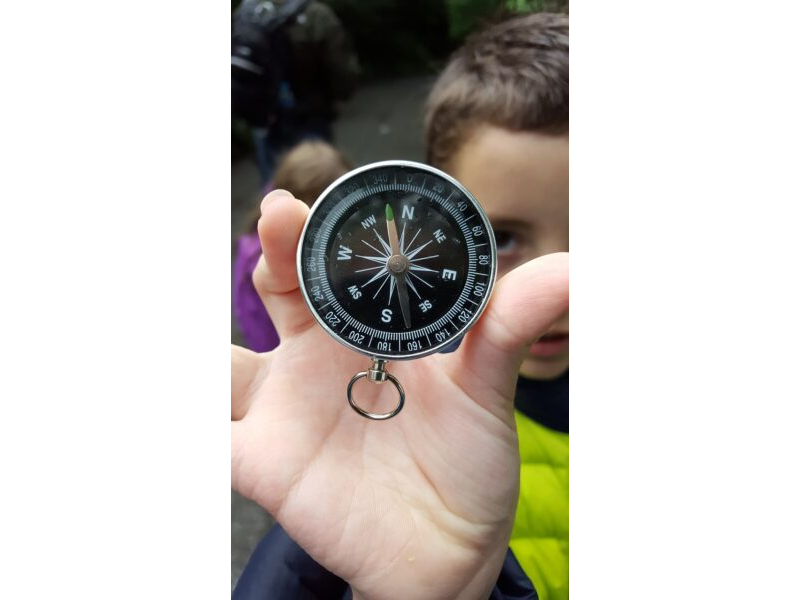
To be honest, I didn’t learn how to follow one until I was learning how to play this game. Although we may not use them in our daily lives, it’s still an important tool to be able to use when necessary. Spend your next few hours of outdoor playtime working on building your child’s compass skills.
Learn More: Educate Outside
27. Create a Bird Book
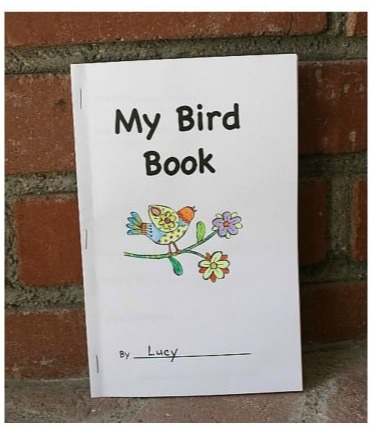
Add your student’s own personal bird book to your out education activities. Bird watching is so beneficial to kids, teaching empathy and building a love for even the smallest living things. It’s a beautiful way to give your kiddos something to do out in nature and enjoy.
Learn More: Buggy and Buddy
28. Whole Class Treasure Hunt
Add this treasure hunt to your outdoor game list, and you won’t be disappointed. Creating the entire treasure map may take some time, but your kiddos will LOVE it. Use it in the classroom year after year to really work those compass skills out.
Learn More: Teaching Ideas
29. Geocaching
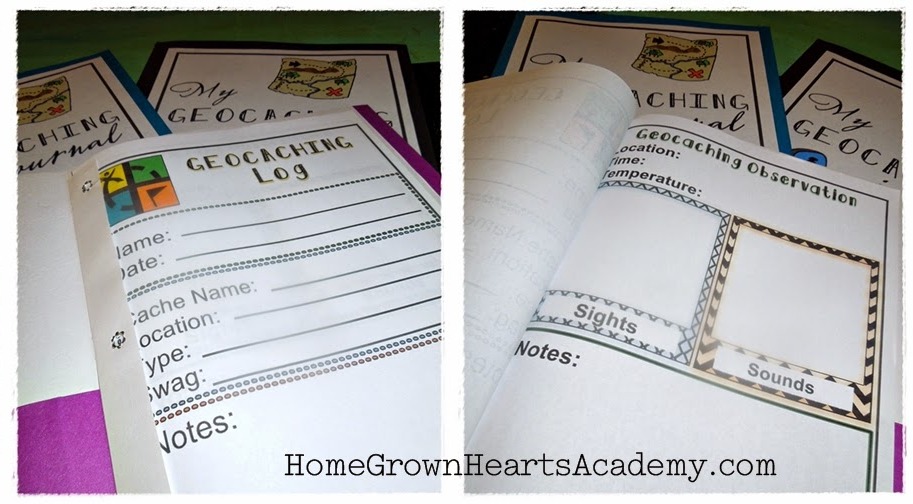
Geocaching is the perfect game to play with your kids on the weekend. Simply download the Geocaching app or learn more and read the maps online. Either way, it’s perfect to get your kiddos out in nature and exploring. Create a Geocaching log to boost observational and note-taking skills.
Learn More: Homegrown Hearts Academy
30. DIY Compass
Make your own compass! Yes, we’ve talked a lot about compasses, mainly because it’s a skill that’s still thriving and essential in the world. The idea behind how a compass works are also very enticing and your kiddos will be totally engaged by the magic that happens deep within the earth. pass works are also very enticing and your kiddos will be totally engaged by the magic that happens deep within the earth.
Learn More: Sci Show Kids
31. Pizza Box Oven
The Pizza Box Oven is a STEAM activity that has been around for years. Your students or kiddos at home will absolutely love this activity. The entire idea behind it is so awesome and just totally outside the box. Have your kiddos try to create their very own oven and see how it works!
Learn More: Science Buddies
32. Nature Painting
With acrylic paint and a collection of beautiful materials, you’ll have some of the most beautiful paintings. Have your kids create any painting they desire, with the catch that they can only use materials found outside to create them (besides the paint).
Make it even more challenging, and learn how to create more using natural paint!
Learn More: Moose Mischief
33. Water Balloon Painting
Okay, this is definitely a favorite with kids of any age! Although simple, it will create hours of fun for your little ones. Be cautious, as putting the thumbtacks into the cardboard can be dangerous for little hands. Make sure that this is done with adult supervision.
Learn More: Mr. Otter Art Studio
34. Water Balloon Dodge Ball
Filling balloons with water unleashes a whole new level for field events. This water balloon dodgeball game is great for upper elementary and middle school field days or birthday parties. It’s so much fun and also very challenging. Perfect for those hot summer days.
Learn More: Channel Super Fun
35. Four Square
Four square is a classic. Yet, some schools don’t have it set up! It’s one of those games that can get really competitive fairly quickly. Meaning it’s very important to establish the basic rules with everyone before playing the game. Maybe even assigning one student to be the “referee” per game.
Learn More: Active Cambridge
36. Swamp Monster
Swamp monster is a really fun game that can be set up anywhere. Kids of all ages can play this game and will most likely enjoy playing it. Once kids learn it, it can be an easy game that students can take on their own and play whenever they have free outdoor time.
Learn More: Splash Games
37. Paper Rockets
Create some paper rockets! This is a great free time activity. Your students will be super excited to create these rockets and even more excited to get outside and launch them! This is a great way to work some STEM activities into your additional class time.
Learn More: Sience Buddies
38. Nature Journal
Have your kiddos get outside with their nature journal. This is a great material for students to keep with them outside and at home. They can find different things in nature to keep in their journals whenever they’re outside.
Learn More: Kendra Renee At Home
39. Plant Confetti Cannon
I love this idea! It’s an excellent idea for the 4th of July or even for a birthday party. Have your students or kiddos create this plant cannon overall quickly and easily! They’ll love letting them off and want to continue to create more and more.
40. Water Balloon Toss
Of course, you can’t have a list of outdoor activities without a water balloon toss! This game is so much fun, less expensive, and less messy than its egg toss counterpart. Kids of any age will love this game’s challenge, focus, and competition.
Learn More: Denver Torr Productions
41. Go on a nature walk
The simplest activity for young children can involve a simple walk through nature. Whether it’s through your backyard or on a nature path at the local park, the outdoors have much to offer in the way of visual stimulus, physical health, and learning about local ecosystems!
Learn More: Raising Children
42. Collect and catalog findings from a nature walk
Maybe you’ve been on a nature walk (or two) and you want to try something more intentional with your outings. Children always love to bring little souvenirs home with them, so why not let them? Flowers, leaves, and rocks can all provide small insights into the larger picture of your local ecosystem (Just be careful you research any potentially hazardous materials first!).
43. Investigate with a nature scavenger hunt
A little different from the last suggestion, this has you prep for the nature walk first. Identify what wildlife you want to look for, making note of preferred locations and ideal conditions. Newts and salamanders prefer dark cool places, right? Help children by investigating under rocks or park equipment! Don’t be afraid to get down and dirty!
Learn More: NAEYC
44. Fun with chalk
This requires some sort of pavement or flat surface for children to draw on. Give them the creative freedom to show you their imaginations! Additionally, let them record their findings from their nature walk. What did their favorite flower look like? Was there a type of bird they saw most often?
45. Outdoor Art Gallery
Set up a gallery walk outside to display the artwork of your children! Invite important people to your child: friends, teachers, and family members, to enjoy a small event that makes use of natural lighting for your little ones. This gives them an opportunity to feel pride in their work while also learning ways to communicate their praise to others. Providing compliments and distinguishing constructive feedback for other children is a nuanced social skill that can help them as they grow.
Learn More: Porto Biomedical Journal
46. Outside journaling
Practice all those fine motor skills, penmanship, alphabet acquisition, and more when you have your little ones take their writing practice outside! Give them small daily prompts, either invoking their imagination or describing their surroundings using their five senses. Since you’re outside, this gives you an excuse to ditch digital screens because the paper is more visible in direct sunlight.
47. Sidewalk Games
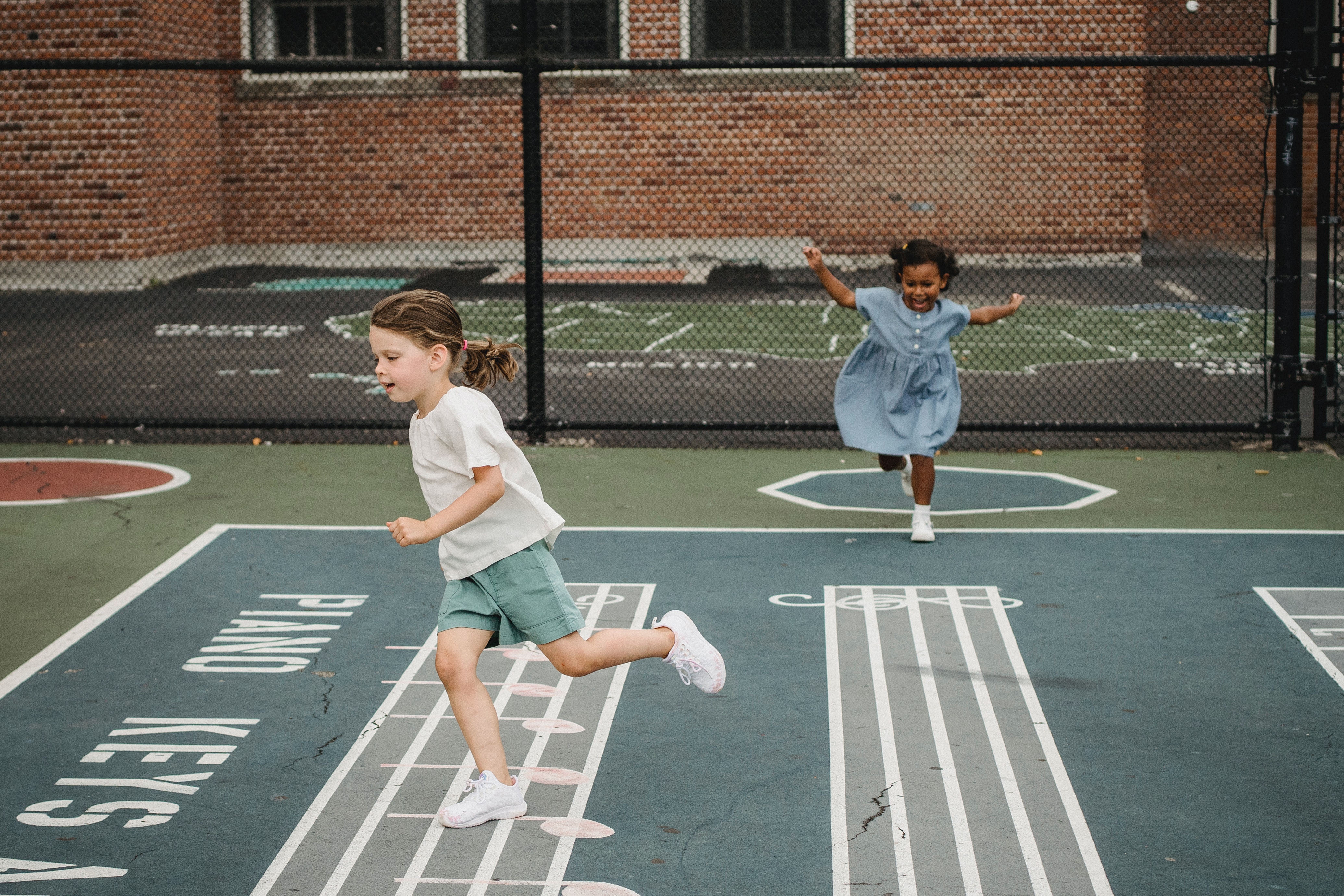
Why not throw spatial awareness and coordination into the mix with that previous chalk? Draw up squares for hopscotch. Create your own version of “the floor is lava” by drawing different-sized circles at different distances for kids to jump across areas.
48. Create your own nature palette

“Going green” and protecting the environment can start at a young age and prove to be fun! Instead of buying paint at the store, explore the outdoors with your little ones and identify their favorite colors. Turn clay into red paint and dandelions into yellow paint.
49. Fun with sprinklers
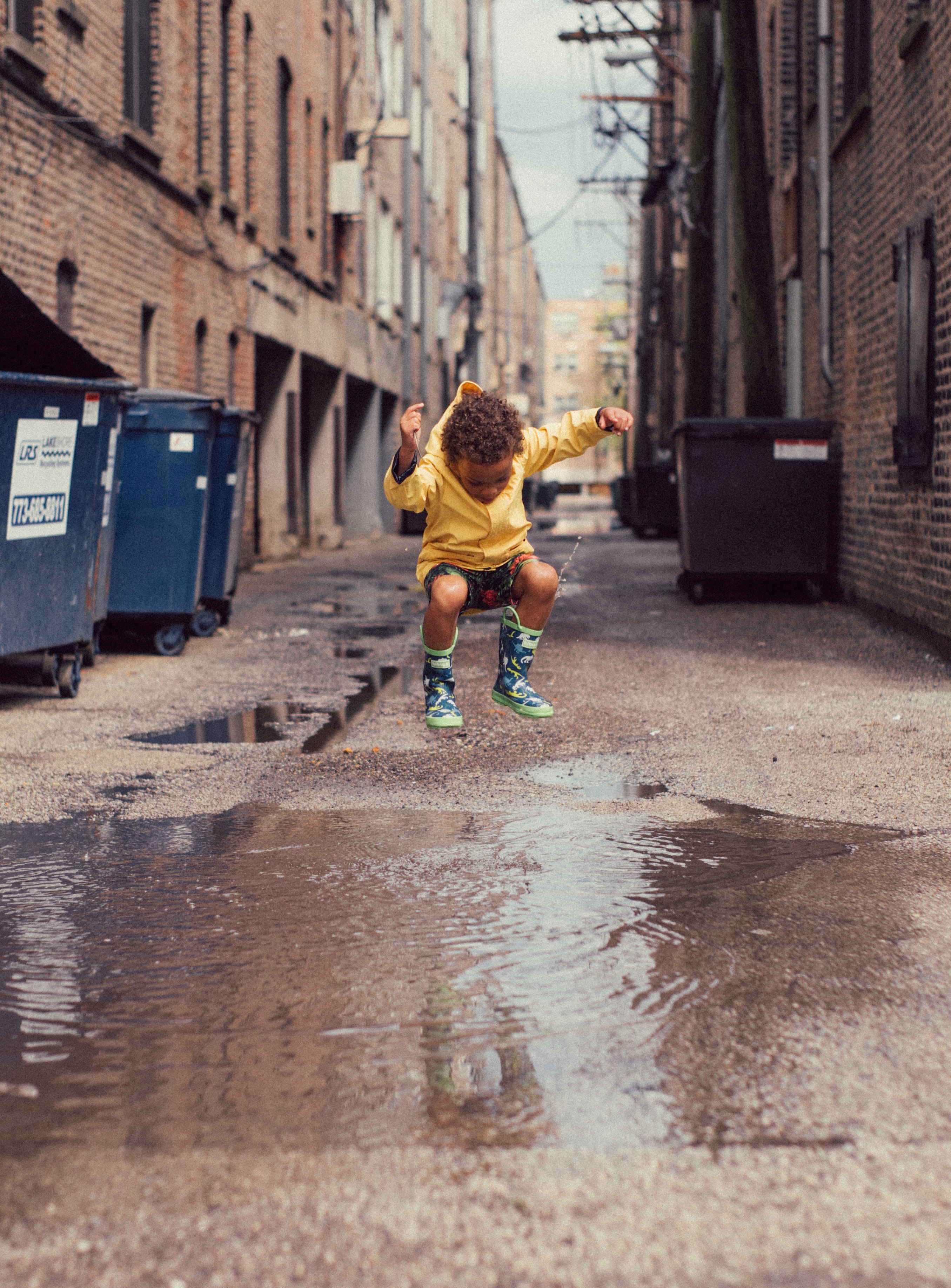
Water play is another sensory stimulus that can prove fun and engaging for children. This can be especially true for neurodivergent children.
Learn More: Learn Behavioral
50. Adopt a plant
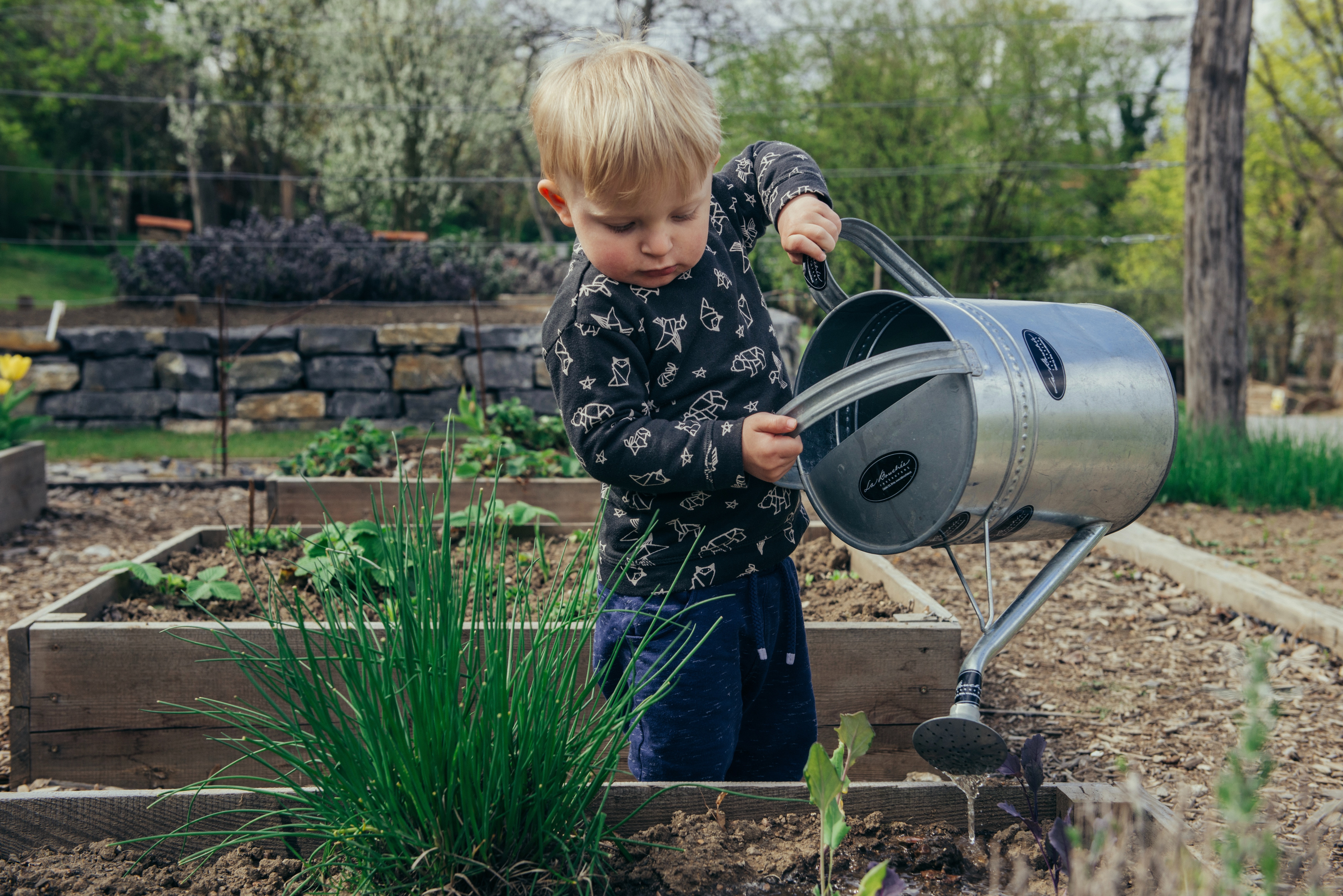
Teach them about the parts of a plant, stems, roots, and petals. Have them grow and cultivate a plant of their own from their own germinated seeds.
51. DIY bubble wands
A little soap and water can go a long way. Try to find items in nature: long blades of grass that can make a loop. Or maybe old materials lying around your house such as unused kitchen utensils.
52. Games with pool noodles
Try an old classic but switch it for unwieldy pool noodles! The padded material is safer to handle than a hockey stick or a baseball bat and can help little ones grip with their small fingers.
53. Water funnels
Learn about the flow of gravity with some DIY water fountains. Use food coloring to teach sorting and manipulation for kids as they hone fine motor skills to pour colored water into designated containers.
54. Mud cafe
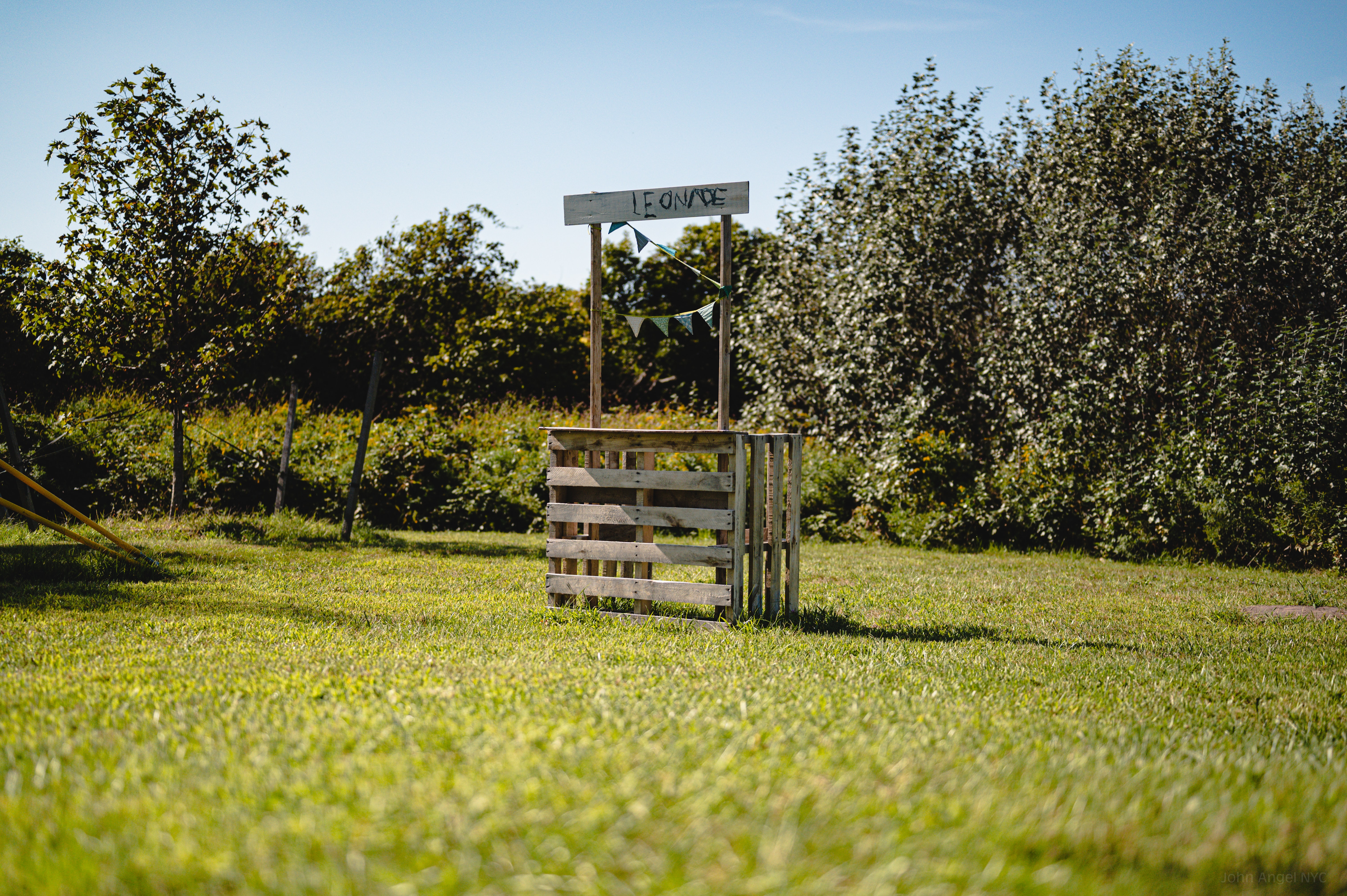
Another new spin on a classic favorite! Don’t be afraid to get down and dirty as young ones play with mud as a sensory stimulant. Teach them basic business and transactions but setting up shop: the precursor to their lemonade stands!
55. Nature art
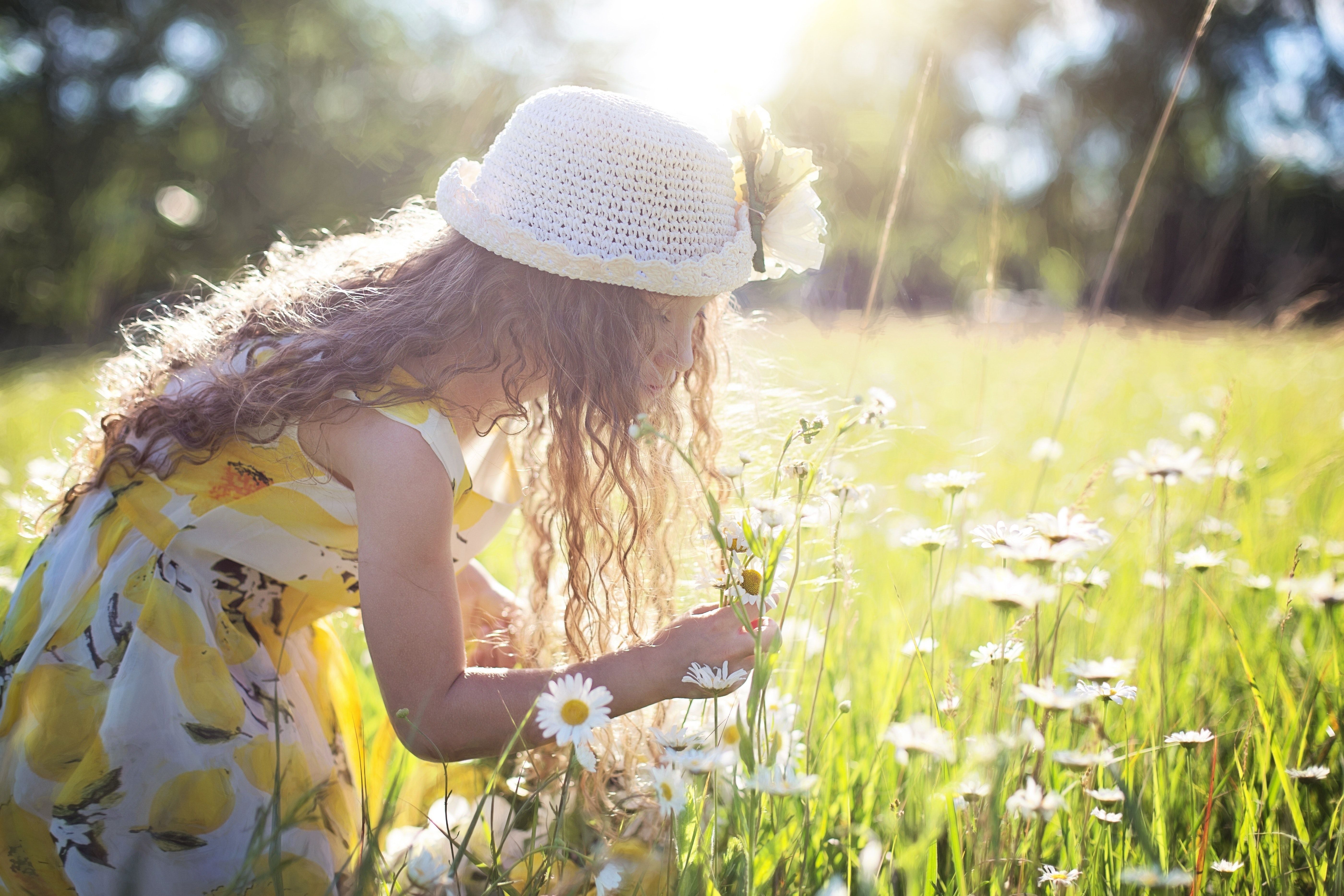
There are more ways to create art than just painting with our homemade paint and drawing with chalk. Collect scraps such as leaves, flowers, and even feathers to paste on paper for children to create a three-dimensional masterpiece!
56. Pet rock
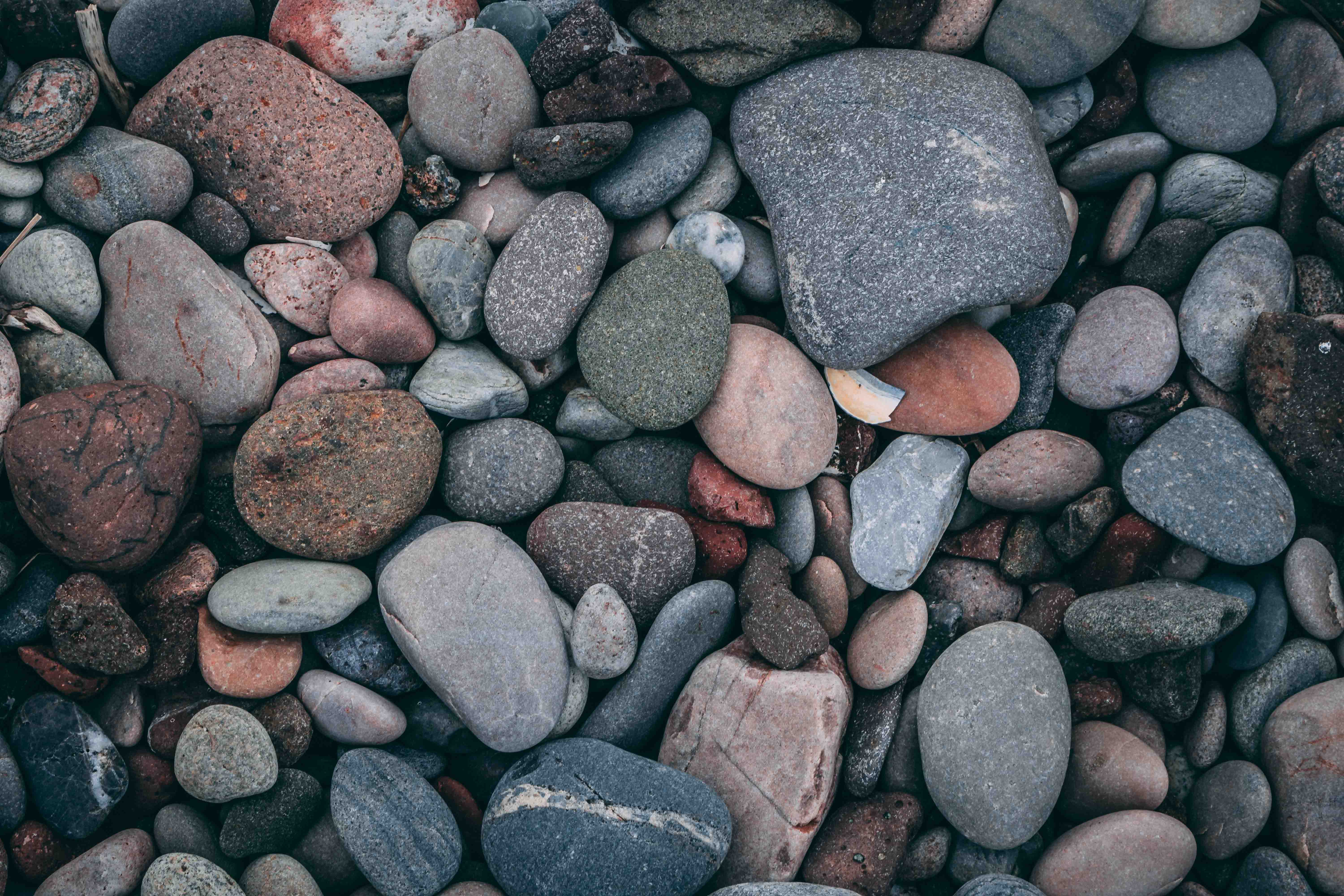
Pet rocks don’t have to be a thing of the past. Search for the perfect stone, glue some googly eyes, and your child is on their way to developing their imagination without the inconvenience, responsibility (or potential allergy risk) of a live pet. Parents can later use these pet rocks for garden ornaments as enduring reminders from these fun days.
57. Leaf rubbings
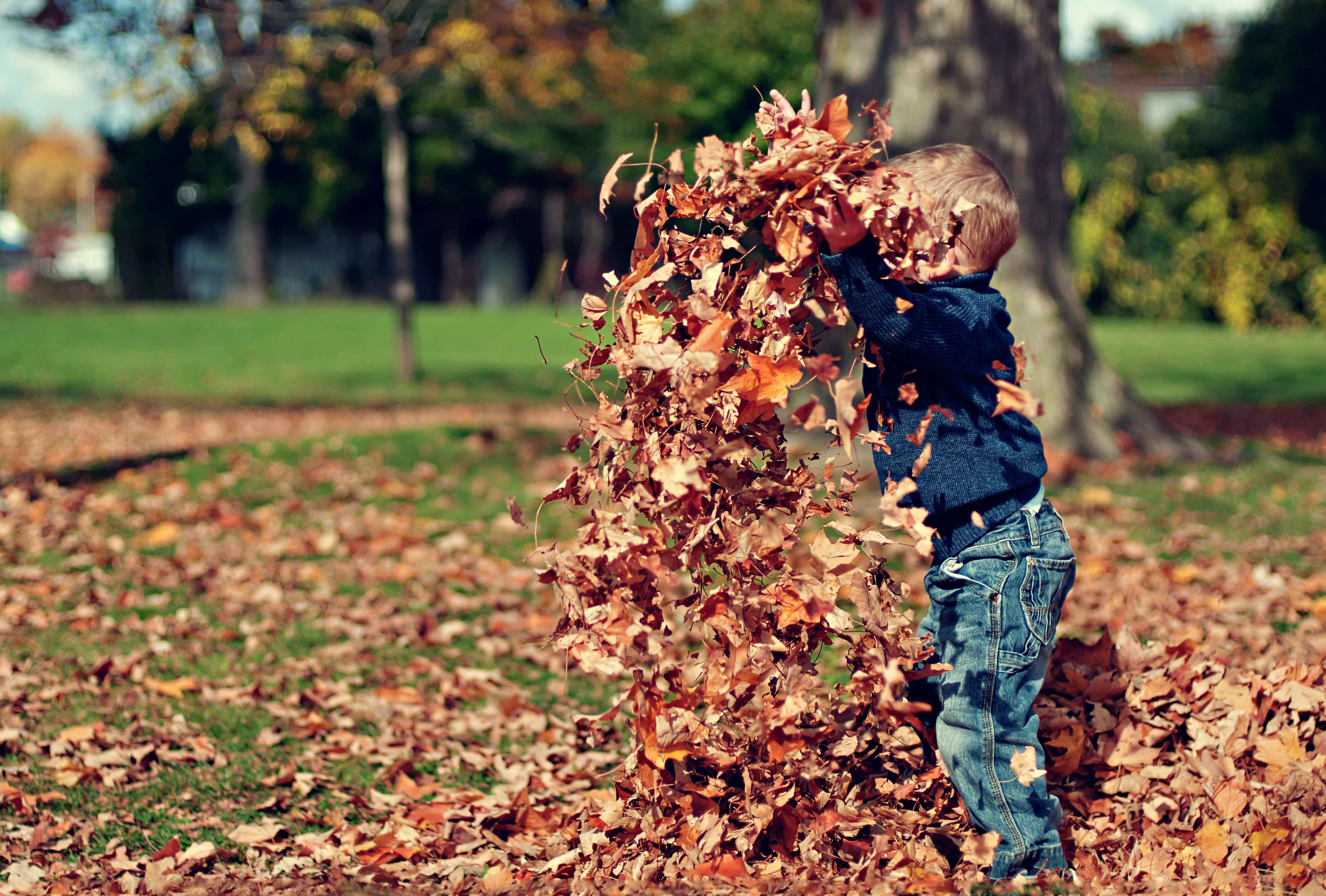
Here is another textured art activity that can double as a science lesson to identify leaves and the trees they came from! Compare leaf shapes and sizes with others you find around the neighborhood. Create an entire collage from all the leaves you collect.
58. Feed the birds
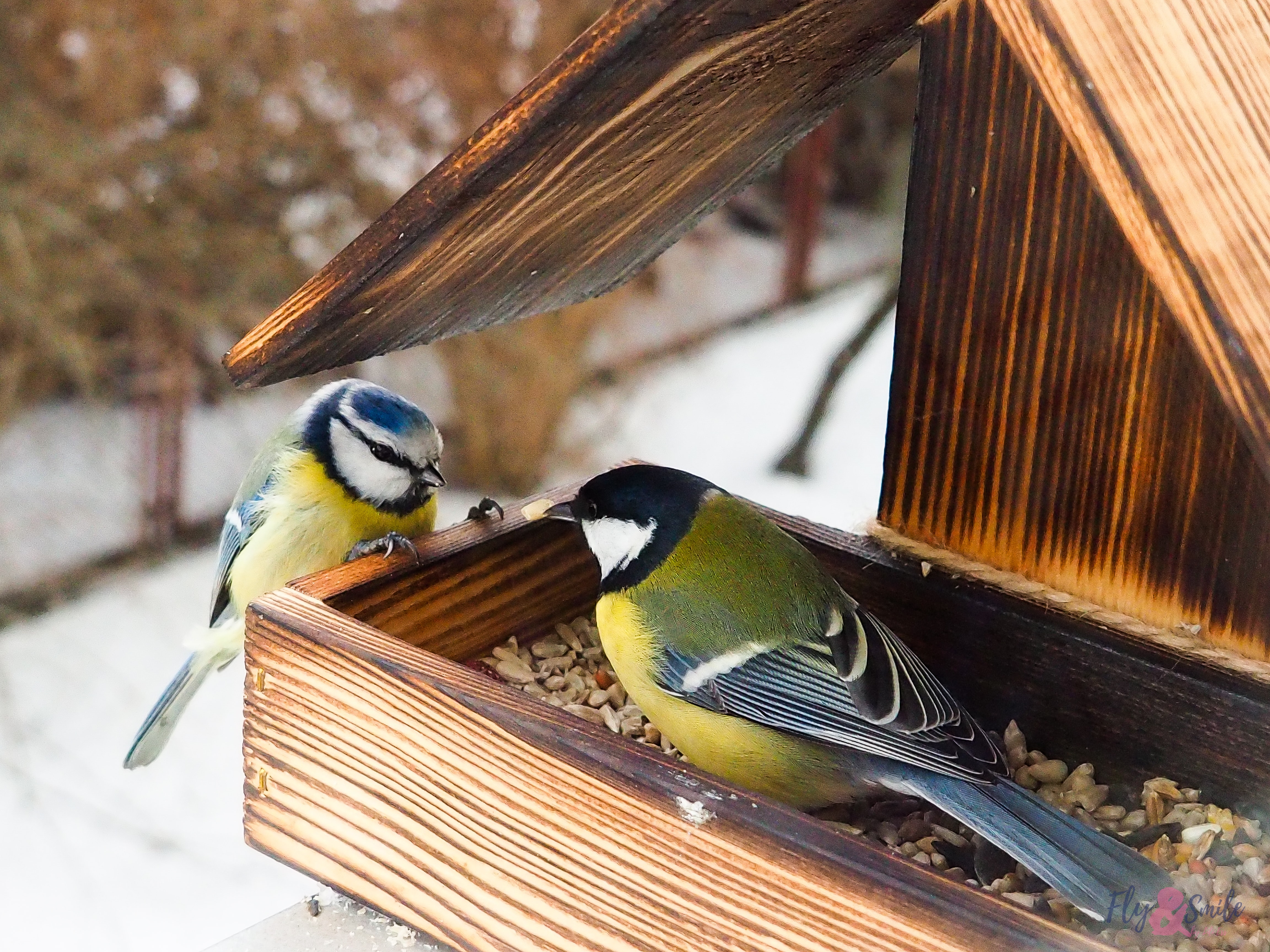
Build a bird feeder to support your local wildlife! Use your previous nature walk to identify the birds common to your area so you can provide specific resources for those species.
59. Reuse and recycle
Don’t throw away boxes or old milk cartons and drink bottles. Repurpose them for birdhouses or bug hotels. Familiarize your children or students with local businesses in the community to determine how they reduce waste. Field trips to your local recycling center can prove informative on what materials can and can’t be recycled while giving back to your hometown.
Learn More: The Seeds Network
60. Meditation and mindfulness
Sometimes we don’t need a grand motive for going outside. Even children need a quiet moment to reflect on their day or what they’ve learned. Perhaps they need some time to recharge, and a moment of meditation can prove instructive for self-regulating explosive emotions.
61. Clover necklaces
While we’re meditating, barefoot on the grass, perhaps you will want to get your hands busy with a seemingly mindless task that also improves fine motor skills. Tie stems of clover flowers together to create necklaces and crowns which can be gifted to friends and serve as beautiful reminders of a lovely day.
62. Volunteer
Some days, the best lesson for a child is how to help others. Visit local charities and nonprofits to determine if they need help cleaning their parking lots. Maybe your local library needs help organizing boxes from a recent food drive. Ask around local businesses to see if they need flyers posted or passed around. These are great opportunities not only for physical exercise and socialization but for practicing good citizenship and selflessness.
Make the leap!
Finding an appropriate and fun outdoor activity doesn’t have to be a daunting task. The world outside your home or school offers many chances to learn about nature, science, and art while practicing socialization and promoting physical wellness. Put a spin on an old classic or combine a few of these suggestions for new and fresh ideas!
Engage your learners with creative, no prep resources

10 Educational Outdoor Learning Activities for homeschool
As a homeschool educator, you’re always looking for new and exciting ways to engage your students and help them learn. While traditional learning is important, incorporating nature-based activities into your lessons can provide a refreshing change of pace and a multitude of benefits for your homeschool learners. In this blog post, we’ll explore 10 of my favorite fun and educational outdoor learning activities for homeschool that you can incorporate to connect with nature and enhance the learning experiences of your students.
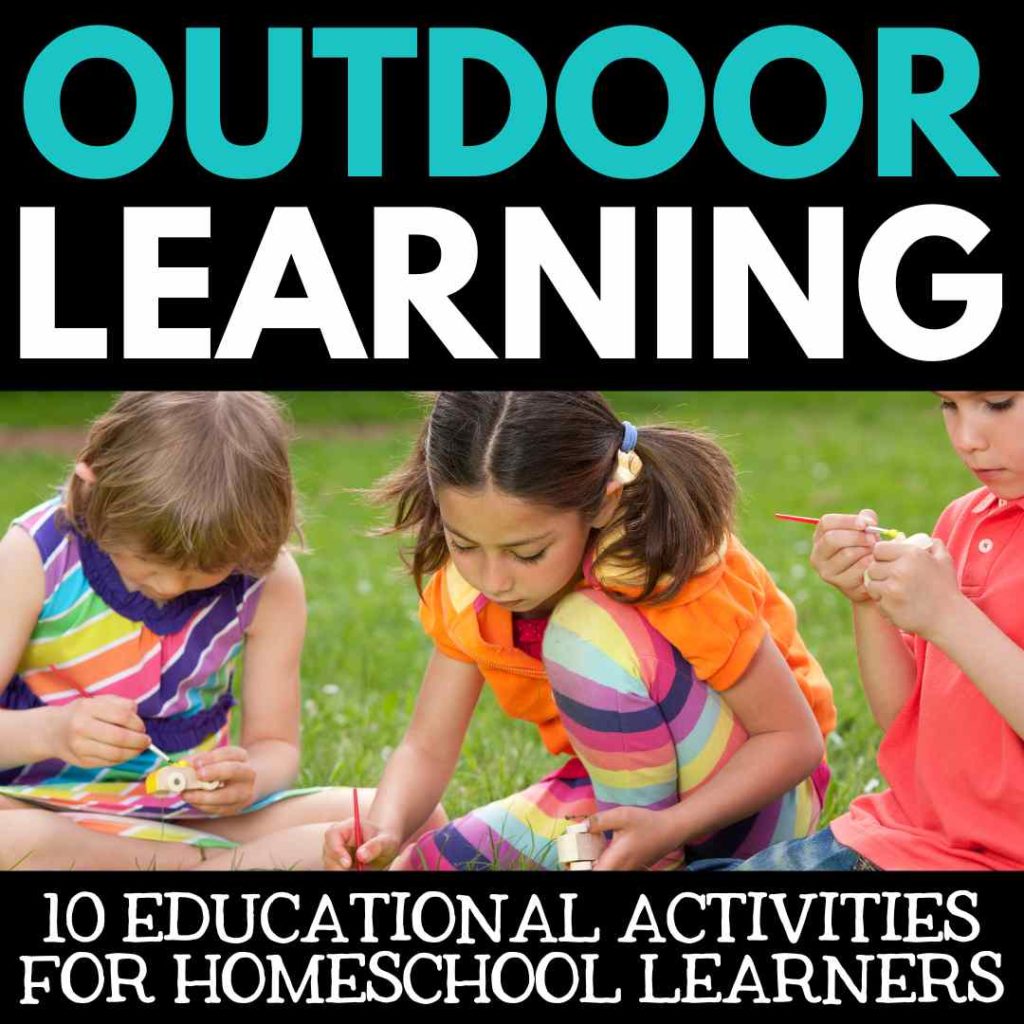
For additional information on the benefits of outdoor learning, check out this blog post.
Nature Scavenger Hunts
A scavenger hunt is a fun way to get students out of the classroom and exploring the great outdoors. Create a list of items for your students to find and encourage them to use their senses to observe and learn about the natural world around them.
Looking for some no prep scavenger hunt activities that you can download and use right away? Check out this fun scavenger hunt bundle by clicking here or on the image below!
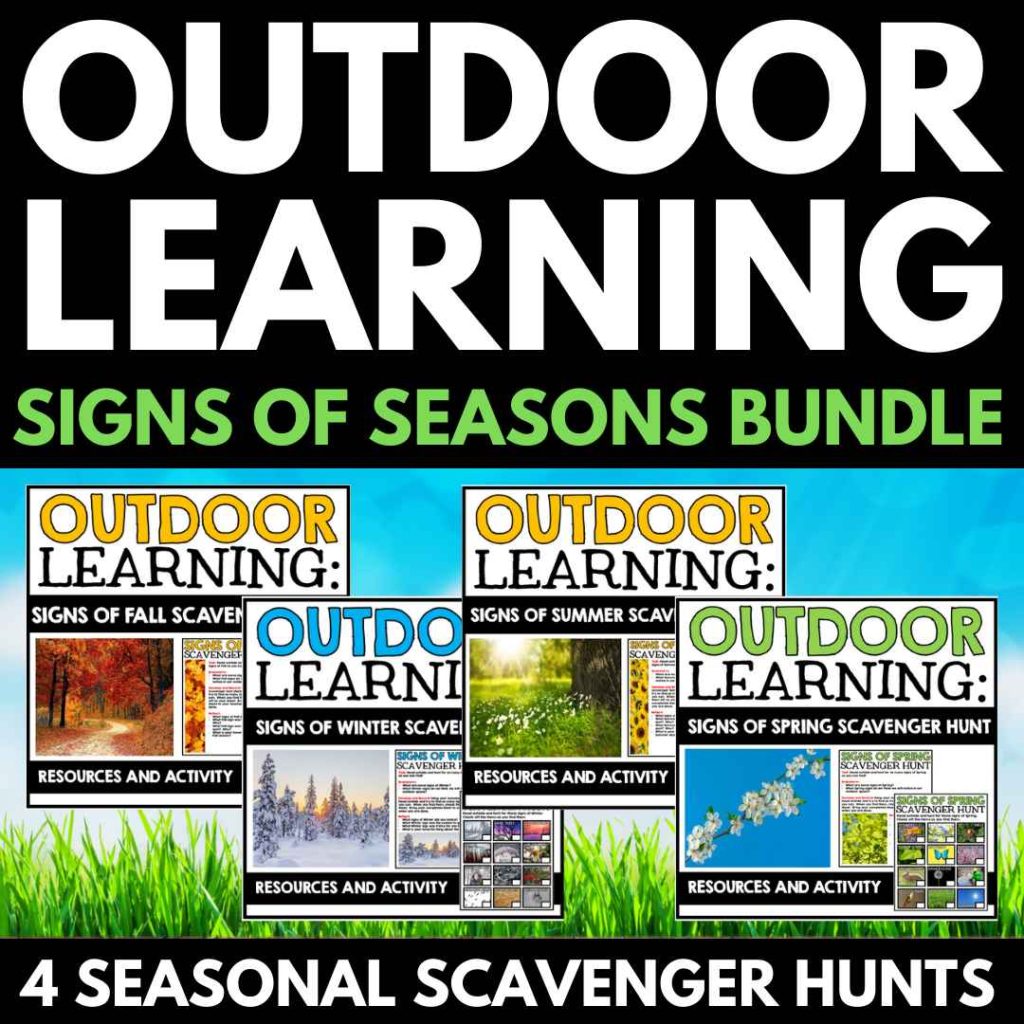
Nature Journals
Provide your students with a blank journal and encourage them to document their observations, sketches, and thoughts about the natural world. This activity can easily be incorporated into a science or art lesson.
Sit Spot activities are great ways to get students started with outdoor journaling, as they ask students to quietly observe and reflect. Read more about Sit Spots here.
Garden Exploration
Whether you have a school garden or visit a community garden, exploring the different plants and animals in the garden can provide a hands-on learning experience for your students. Also, there is nothing quite like the feeling of immersing your hands in warm soil and enjoying fresh fruits and veggies that you grew yourself!
Nature Walks
Nature walks are an excellent way to engage students in active learning and foster a deeper appreciation for the environment. By encouraging students to observe and learn about the plants and animals they encounter, you can help them gain a better understanding of the intricate connections between living things and their environment.
Incorporating nature walks into science or social studies lessons can provide a unique and engaging perspective on a wide range of topics. For example, students can learn about the life cycles of plants and animals, the interactions between organisms in an ecosystem, or the impact of human activity on the natural world. By exploring nature firsthand, students can develop a greater sense of curiosity and wonder about the world around them, which can lead to a deeper appreciation for science and the environment.
Furthermore, nature walks can be a great way to foster teamwork and collaboration among students. As they explore the natural world together, students can work in groups to identify and learn about different species of plants and animals. They can also share their observations and insights with one another, fostering a sense of community and shared learning.
Looking for some fun ways to incorporate nature walks into your homeschool lessons? Check out the resource below!
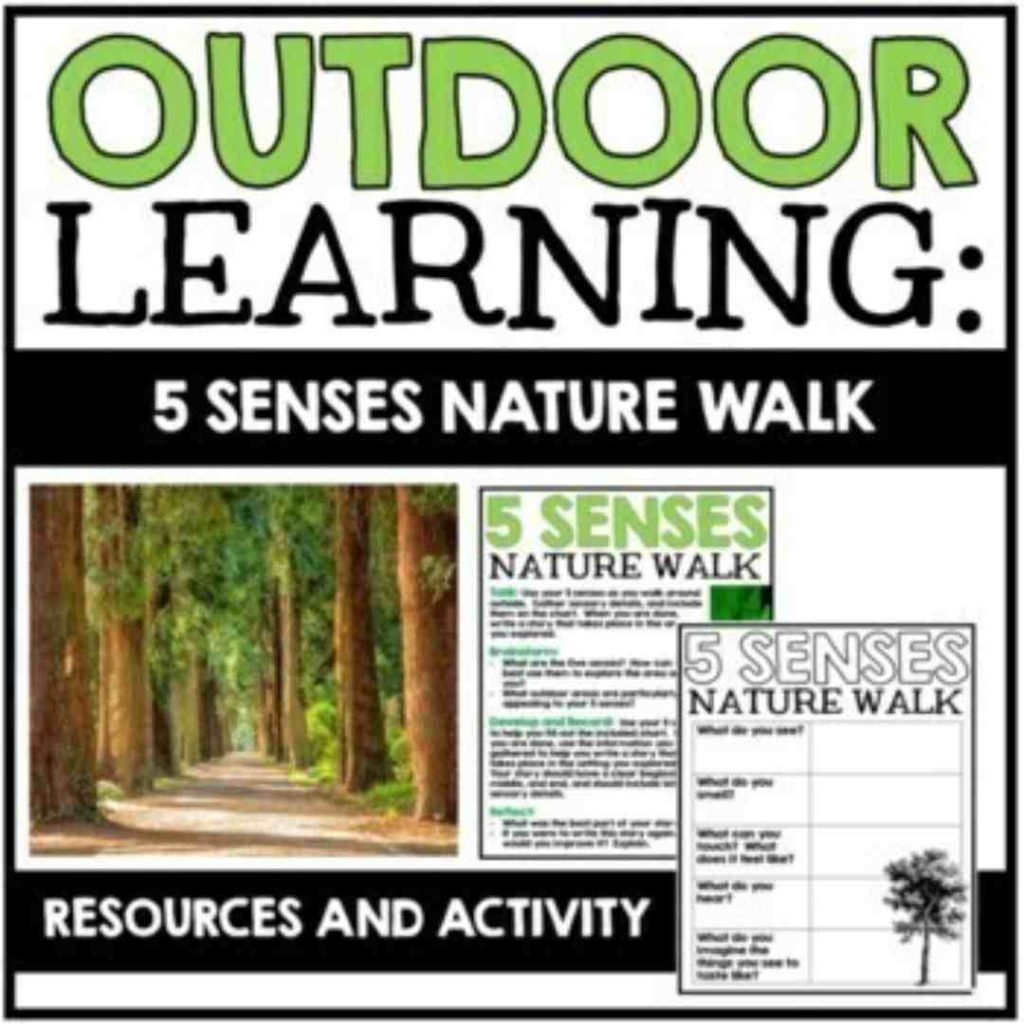
Cloud Watching
Cloud watching is a simple yet effective way to help students relax and connect with nature.
Encouraging students to observe and document different types of clouds they see and the weather patterns they predict can help them gain a better understanding of the science behind weather forecasting. By doing so, they can learn how to identify different types of clouds and understand the role they play in predicting weather patterns. Additionally, this activity can provide a calming and meditative experience for students, allowing them to take a break from their daily routine and connect with nature.

Cloud watching is a great way to teach interdisciplinary concepts as well. For example, students can learn about the water cycle, air pressure, and atmospheric phenomena while observing the clouds. This activity can also be used to spark creativity and imagination in students. Encourage them to come up with stories, poems, or art inspired by the clouds they see, allowing them to express their thoughts and ideas in a creative way.
Outdoor Math
Incorporate math into your outdoor activities by playing math games such as hopscotch or using natural materials like rocks or sticks to teach addition and subtraction. What better way to encourage students to enjoy and experiment with mathematical concepts then by encouraging them to explore natural manipulatives in the great outdoors!
Interested in incorporating some outdoor math activities into your lessons? Check out this fun math bundle below!
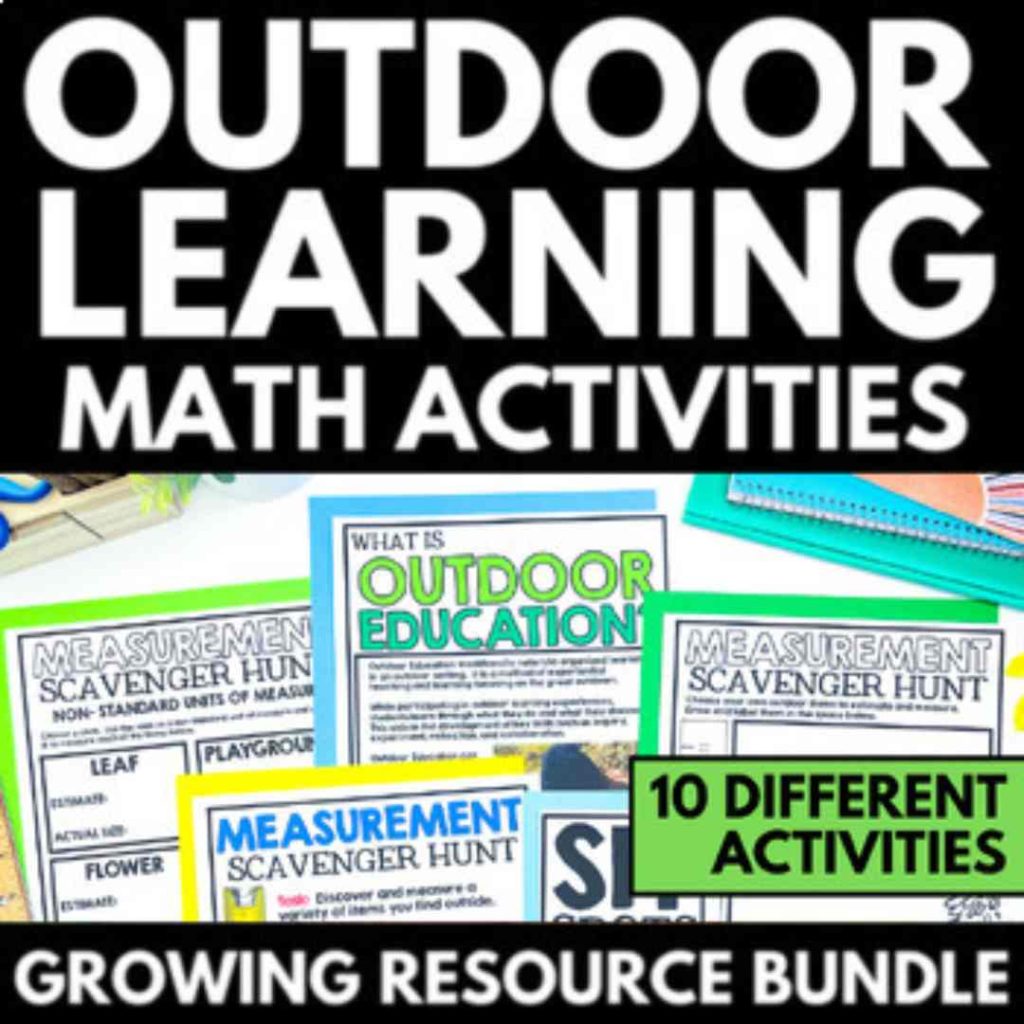
Bird Watching
Encouraging students to observe and identify different bird species can help them develop their observational skills and learn about the diverse range of birds that exist in their local environment. By doing so, they can gain an understanding of bird behavior, nesting habits, and migration patterns. Additionally, this activity can provide an opportunity for students to learn about the importance of biodiversity and the role birds play in maintaining a healthy ecosystem.
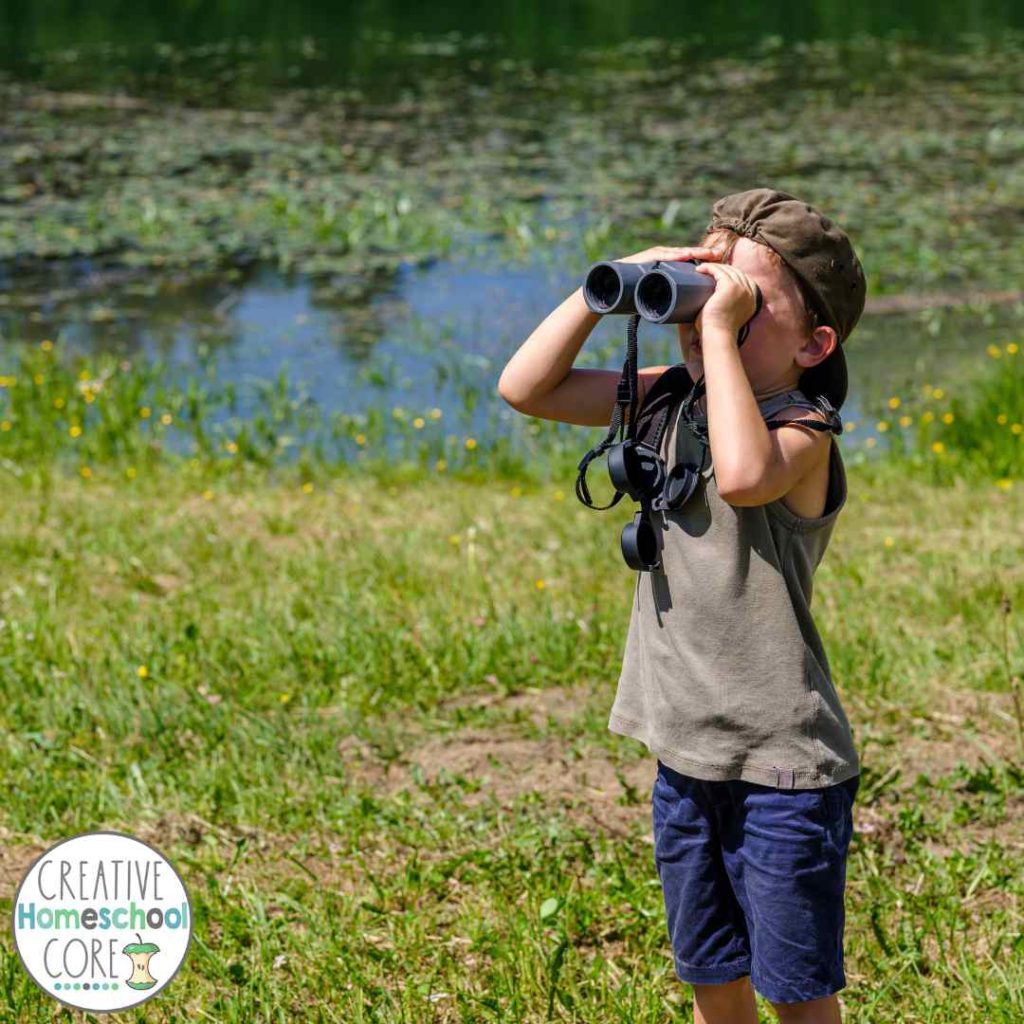
Moreover, birdwatching can be a great way to incorporate technology and citizen science into your lessons. There are several apps and websites available that allow students to record and share their bird sightings with other birdwatchers worldwide. This can foster a sense of community and shared learning among students, while also providing opportunities for them to engage with the broader scientific community.
Lastly, observing and identifying different bird species can be an excellent way to teach interdisciplinary concepts, such as geography, history, and culture. For instance, students can learn about the different migratory patterns of birds and the cultural significance of certain bird species in different parts of the world.
Collecting natural materials to create works of art can be an excellent way to engage students in creative thinking and foster a deeper appreciation for the natural world.

Encouraging students to collect natural materials such as leaves, sticks, and flowers can help them develop their observation skills and learn about the diverse range of plant life that exists in their local environment. By doing so, they can gain an understanding of the different colors, textures, and shapes found in nature, and how they can be incorporated into their artwork. This activity can also provide a calming and meditative experience for students, allowing them to take a break from their daily routine and connect with nature.
On the hunt for some fun outdoor art activities ? Check out the bundle below – it contains a wide variety of different nature art activities for students to complete outdoors.
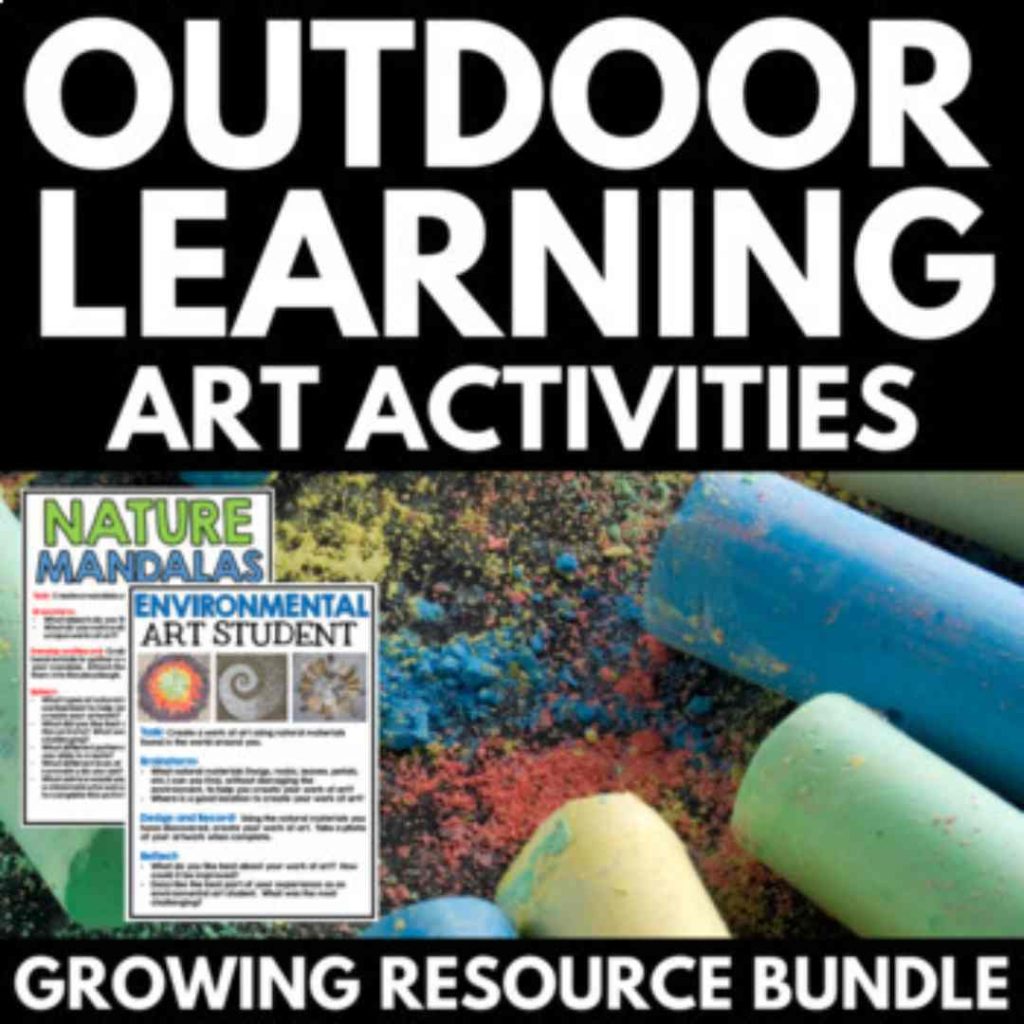
Outdoor Reading
Encouraging students to find a comfortable spot and read a book about nature or the outdoors can help them develop their reading comprehension and critical thinking skills while fostering a deeper appreciation for the natural world.
Additionally, this activity can provide an opportunity for students to disconnect from their daily routine, reduce stress levels, and improve their mental well-being. Taking a break from technology and spending time in nature can help students feel more relaxed, focused, and energized. It can also provide a quiet and peaceful environment for reading, allowing students to concentrate on their books without distractions.

Nature Writing
Encouraging students to observe and reflect on the natural world can help them develop their descriptive writing skills while gaining a deeper appreciation for the environment.
Additionally, incorporating writing prompts into your lessons can provide an opportunity for students to express their thoughts and ideas in a creative and meaningful way. Encourage students to use their imagination and creativity to write stories, poems, or essays about their experiences in nature. This can help them develop their writing skills and explore their emotions and feelings in a safe and supportive environment.
Interested in introducing some outdoor writing activities into your homeschool curriculum? Check out this bundle below – it contains a variety of different nature inspired activities!
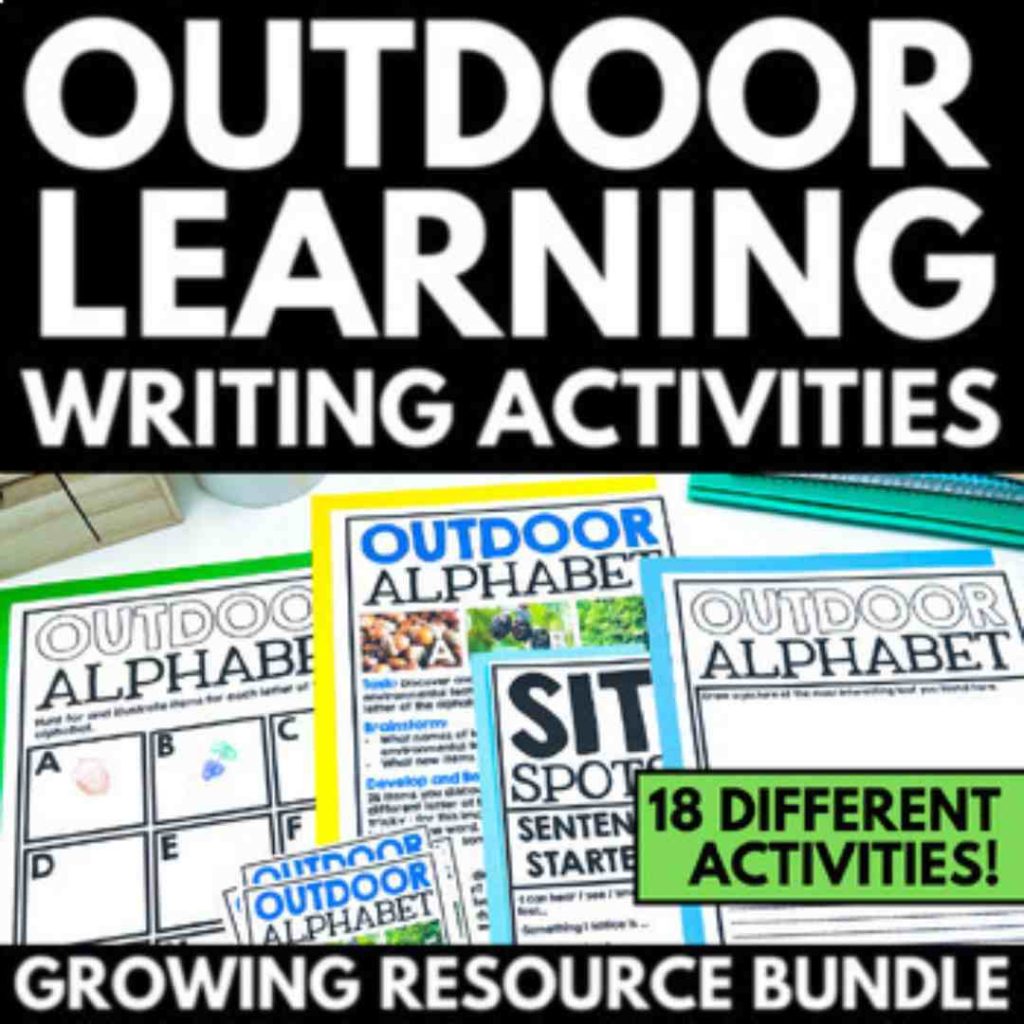
Incorporating these outdoor learning activities into your classroom can provide a fun and engaging way to connect your students with nature while enhancing their learning experiences. By optimizing your lessons with nature-based activities, you’ll promote a love for the environment and encourage your students to become lifelong learners.
Looking for more outdoor learning activities for homeschool?
Be sure to check out the blog post below!
Outdoor Learning Activities for Homeschool – Earth Day
Benefits of Outdoor Learning Activities for Homeschool Students
Interested in signing up for my email list?
If you are interested in signing up for my email list, you can do so by clicking on the link below. I periodically send out emails with free resources, teaching tips, and exclusive deals. Signing up will also give you immediate access to some of my best selling Interactive Notebook resources – foldable projects, graphic organizers, and other fun activities.

Similar Posts

Tips for creating a positive homeschool experience
As a homeschool parent, it can be a challenge to create a happy and successful learning experience for your children. But with the right mindset and approach, you can create…

Benefits of Outdoor Learning for Homeschool
With the rise of homeschooling, more and more parents and teachers are exploring ways to make learning more fun, engaging, and accessible. Outdoor learning provides an opportunity to explore the…
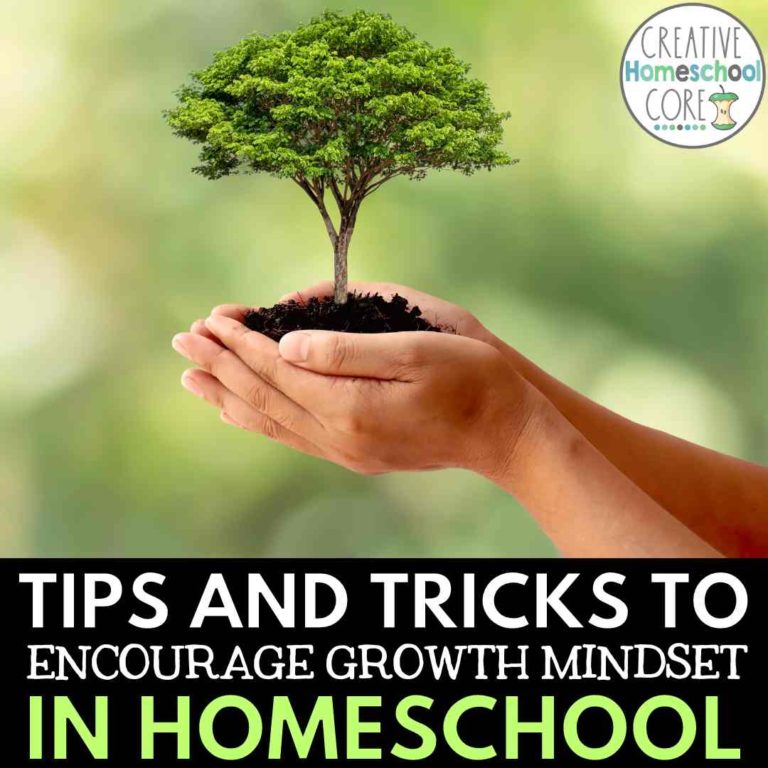
Encouraging a Growth Mindset in Homeschool
As homeschool parents, we’re sure you’ve come across the concept of Growth Mindset by now. It has been quite the buzzword in education lately, and for good reason! Research shows…

Engaging Earth Day Activities for Homeschool
Earth Day is a special day to celebrate the earth and take action to protect it. It’s a great opportunity to teach kids about the importance of taking care of…

7 Reasons to encourage summer reading
Summer is a time for fun, relaxation, and exploration. But did you know that summer reading can have a significant impact on students’ academic success? In this blog post, we’ll…

Welcome to Creative Homeschool Core
I feel like the first post on the new blog calls for a bit of an introduction! My name is Marissa, and I am so happy you are here! I…
Training & Resources
The muddy puddle teacher, buy our books.
- All Training
- Free Outdoor Award (level 1)
- Outdoor Award (level 2-4)
- Continuous Prov (level 5)
- Coordinator (level 6)
- School Award (level )
- All Resources
- Babies (0-2yrs)
- Tots (2-4yrs)
- EYFS (4-5yrs)
- KS1 (5-7yrs)
- LKS2 (7-9yrs)
- UKS2 (9-11yrs)
- Demo’s
50 Top Outdoor Learning Activities
Outdoor learning offers an excellent opportunity to engage children in hands-on, experiential education that promotes physical, cognitive, and emotional development. Integrating outdoor activities into the curriculum can make learning more dynamic and enjoyable. Here are 50 top outdoor learning activities for primary school children that cover a range of subjects and skills.
1. Nature Walks
Take students on nature walks to explore local flora and fauna. Discuss the different plants and animals they encounter.
2. Leaf Rubbings
Collect leaves and use crayons to create leaf rubbings. This activity can be linked to lessons on plant biology.
3. Bug Hunt
Organise a bug hunt to observe insects in their natural habitat. Students can record their findings in a nature journal.
4. Weather Station
Set up a simple weather station to monitor daily weather conditions. Students can learn about meteorology and record data.
5. Outdoor Maths Trails
Create a maths trail with questions and challenges related to the environment. This encourages practical application of maths skills.
6. Planting a Garden
Have students plant and maintain a garden. They can learn about plant life cycles, photosynthesis, and sustainability.
7. Bird Watching
Teach students to identify local birds. Provide binoculars and guidebooks to help them record their observations.
8. Nature Art
Use natural materials to create art projects, such as leaf collages or stick sculptures. This activity combines creativity with environmental awareness.
9. Outdoor Storytelling
Encourage students to create and tell stories inspired by nature. This can enhance their literacy skills and imagination.
10. Rock Painting
Collect rocks and paint them with various designs. This activity can be linked to lessons on geology and art.
11. Soil Study
Examine different types of soil and discuss their properties. This can be part of a broader lesson on earth science.
12. Tree Identification
Teach students to identify different tree species by their leaves, bark, and seeds. They can create a tree identification guide.
13. Outdoor PE Games
Incorporate traditional PE games like relay races and obstacle courses into the outdoor setting to promote physical activity.
14. Shadow Drawing
Use the sun to create shadow drawings. Students can learn about light and shadows and how they change throughout the day.
15. Bug Hotel
Build a bug hotel to provide a habitat for insects. This project teaches students about biodiversity and ecosystems.
16. Outdoor Music
Use natural materials to create musical instruments. Students can explore sounds and rhythms in an outdoor orchestra.
17. Outdoor Reading Time
Create a cosy outdoor reading area where students can enjoy books surrounded by nature. This encourages a love for reading.
18. Environmental Clean-Up
Organise a clean-up event to pick up litter in the local area. This teaches students about environmental responsibility.
19. Map Reading
Teach students to read maps and use a compass. They can practice by navigating a course set up on the school grounds.
20. Weather Journals
Have students keep a weather journal to record daily weather observations and patterns.
21. Outdoor Theatre
Create a stage in an outdoor area and have students perform plays or skits. This activity encourages public speaking and creativity.
22. Butterfly Garden
Plant flowers that attract butterflies and observe their life cycle. Students can learn about metamorphosis and pollination.
23. Pond Dipping
Explore a local pond to study aquatic life. Students can observe and identify different species of insects, plants, and animals.
24. Story Stones
Create story stones by painting images on rocks. Students can use them to create and tell their own stories.
25. Sundial Making
Build a sundial to teach students about timekeeping and the movement of the sun.
26. Nature Scavenger Hunt
Organise a scavenger hunt with a list of natural items for students to find and collect.
27. Animal Tracks
Study and identify animal tracks in the school grounds or local park. This can be linked to lessons on wildlife.
28. Rock Cycle
Teach the rock cycle by examining and classifying different types of rocks found outdoors.
29. Herb Garden
Plant a herb garden and discuss the uses of different herbs in cooking and medicine.
30. Outdoor Maths Games
Incorporate maths games like hopscotch, number lines, and measuring activities into the outdoor setting.
31. Compass Trails
Create a compass trail where students use a compass to navigate to different points and find clues.
32. Nature Journals
Encourage students to keep a nature journal where they document their observations and reflections about the natural world.
33. Cloud Watching
Teach students to identify different types of clouds and discuss weather patterns.
34. Outdoor Fitness Circuit
Set up a fitness circuit with different exercise stations. This promotes physical health and coordination.
35. Nature Mandalas
Create mandalas using natural materials like leaves, flowers, and stones. This activity combines art with mindfulness.
36. Geocaching
Engage students in geocaching, a treasure hunt using GPS devices to find hidden containers.
37. Tree Ring Study
Examine tree rings to learn about the age of trees and historical climate conditions.
38. Outdoor Yoga
Introduce students to yoga by practising poses in a natural setting. This promotes relaxation and physical health.
39. Solar Oven
Build a solar oven to teach students about solar energy and cooking without electricity.
40. Nature Poems
Encourage students to write poems inspired by nature. This can enhance their creative writing skills.
41. Outdoor Maps
Have students create maps of the school grounds or local area, practising their geography skills.
42. Butterfly Lifecycle
Raise butterflies from caterpillars and observe their transformation. This teaches students about lifecycles and metamorphosis.
43. Wind Observations
Use wind vanes and anemometers to study wind direction and speed.
44. Outdoor Theatre
Perform plays or skits outside, using natural scenery as the backdrop. This enhances creativity and public speaking skills.
45. Clay Modelling
Use natural clay to create sculptures or models. This can be linked to lessons in art and geology.
46. Seed Dispersal
Study different methods of seed dispersal by observing plants in the area and discussing their strategies.
47. Water Cycle Demonstration
Create a mini water cycle using natural elements to show how water moves through the environment.
48. Solar System Walk
Set up a scale model of the solar system outdoors. Students can walk through it to understand the relative distances between planets.
49. Wildlife Habitat Creation
Build habitats for local wildlife, such as birdhouses or hedgehog homes, and observe the animals that move in.
50. Recycling Project
Create art or functional items from recycled materials found outdoors. This teaches sustainability and creativity.
Recommended Resources from Muddy Puddle Teacher
To support outdoor learning in primary schools, Muddy Puddle Teacher offers a variety of resources:
- Outdoor Learning Guides
- Environmental Education Resources
- Health Benefits of Outdoor Learning
- Sustainable Classroom Activities
- Teamwork Activities
Outdoor learning offers a wealth of opportunities to enhance primary education through engaging, hands-on activities. These 50 outdoor learning activities provide a diverse range of options to integrate nature into your curriculum, fostering a love for learning and the environment among students. Embrace the outdoors as a classroom and watch your students thrive as they explore, discover, and learn.
You need a subscription to download this file. Log in/U pgrade or Sign up . Feel free to Send us a message if you need help.
Outdoor Handbook Dyslexia
by The Muddy Puddle Teacher | Oct 24, 2024 | Special Needs Resources
The Outdoor Handbook for Dyslexic Children by The Muddy Puddle Teacher: A Teacher’s Essential Guide Transform your outdoor lessons and make learning accessible for all with the Outdoor Handbook for Dyslexic Children by The Muddy Puddle Teacher. Specifically designed...
The Great Fire of London Lesson Plan (Rope Method)
by The Muddy Puddle Teacher | Oct 20, 2024 | History (KS1) , KS1 Outdoor Learning , Resources
The Great Fire of London Lesson Plan (Muddy Puddle Teacher Approach) Explore the Great Fire of London lesson plan with the innovative Muddy Puddle Teacher (MPT) approach, designed to take learning outdoors and make history an immersive experience for every child. This...
Outdoor Dyscalculia Handbook
by The Muddy Puddle Teacher | Oct 16, 2024 | Special Needs Resources
Outdoor Dyscalculia Handbook: A Practical Guide for Hands-On Math Learning in Nature The Outdoor Dyscalculia Handbook is a unique and engaging resource designed to help educators, parents, and therapists support children with dyscalculia through outdoor activities....
ADHD Outdoor Therapy Handbook
by The Muddy Puddle Teacher | Oct 12, 2024 | Special Needs Resources
Exploring the Benefits of ADHD Outdoor Therapy: A Guide for Educators and Parents 1 x Handbook with Outdoor Therapy Ideas for children with ADHD As we learn more about ADHD and its impacts on children, educators and parents are seeking creative, effective ways to...
Outdoor Autism Therapy Handbook
by The Muddy Puddle Teacher | Oct 10, 2024 | Uncategorised
Introducing the Outdoor Autism Therapy Handbook: A Natural Approach to Autism Support In recent years, educators and therapists have increasingly recognized the value of outdoor environments in supporting children with autism. From sensory integration to social...
Halloween Parent Ideas Handout (Autumn Holidays)
by The Muddy Puddle Teacher | Oct 3, 2024 | parents , Uncategorised
What does this resource include? 1 x Handout for Parents (Autumn 1 Half Term) How can I use this resource? Celebrate Halloween and the autumn holidays with this engaging and informative Halloween Parent Handout, designed to help parents make the most of the season...
Outdoor Speech & Language Handbook
by The Muddy Puddle Teacher | Oct 3, 2024 | Special Needs Resources
What does this resource include? 1 x Handbook separated into the 5 areas of speech and language. Each area will give a short explanation and practical methods to help children develop in this area. The areas covered are: Phonological difficulties Apraxia in speech...
Summer Nature Journal (Summer Holidays)
by The Muddy Puddle Teacher | Jul 28, 2024 | Resources
The Muddy Nature Journal, offered by The Muddy Puddle Teacher, is a downloadable resource designed to engage families in outdoor activities. This summer edition includes various nature-based activities such as scavenger hunts for petals, leaves, plants, and bugs, as...
What is an Outdoor Teacher?
by The Muddy Puddle Teacher | Jul 28, 2024 | Ask Us
What is an Outdoor Teacher? In recent years, outdoor education has gained significant momentum, redefining the boundaries of traditional classroom settings. As an outdoor teacher, you are at the forefront of this educational revolution, fostering a deeper connection...
8 Outdoor London Bridge Ideas
by The Muddy Puddle Teacher | Jul 28, 2024 | History , KS1 demonstration videos
This lesson plan offers a comprehensive and interactive approach to teaching children about the London Bridge. It includes outdoor activities like recreating the bridge’s timeline, enacting historical events, and constructing their version of the bridge. It also...
Privacy Overview

The Homeschool Resource Room
creative ideas, practical advice, genuine support

10 Educational Outdoor Activities (that you can try tomorrow!)
This post may contain affiliate links. See our disclosure policy for details.
You’ve all heard how educational outdoor activities can be for our kids. However, when you actually stop to think of ideas, it’s easy to get stumped! (Pun completely intended, of course.)
The next time you want to take your tykes outside for some enriching outdoor play, break out this list and its counterpart, 10 MORE Educational Outdoor Activities for Kids . Most of these educational outdoor activities are broad enough to appeal to many age groups, and can even be done with multiple ages at once. (If you’d like to learn more about how to get all your kids of various ages learning about the same thing at the same time, check out our newest ebook on Homeschooling with Unit Studies . Many of the following educational outdoor activities are actually great jumping off points to start a unit study, if you wanted to try!)
In addition, I’ve included a list of many academic subjects that correspond with each activity. So if you’re specifically looking for something to do outside to help with your poetry curriculum, for example, just search for poetry and it will come right up!
Without further ado, here are ten favorite educational outdoor activities!
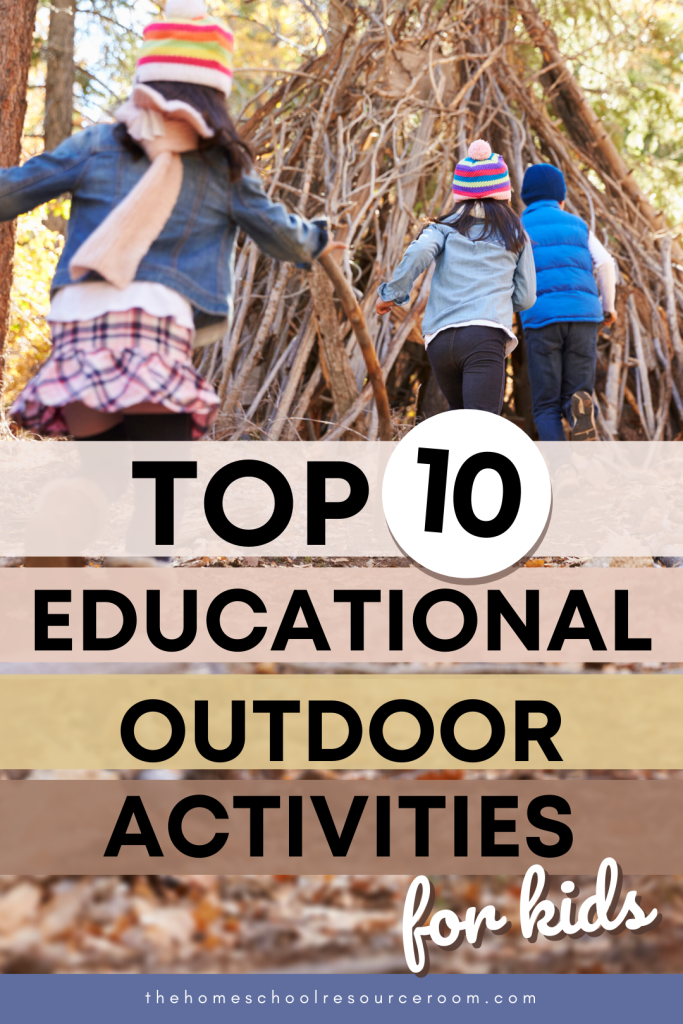
Educational Outdoor Activities #1-5: Using a nature box
Take a small container outside with you. (Pro tip: Tupperware, old shipping boxes, and shoe boxes work fine, but if you can spare a wooden box , woven basket, or something similarly special, you can elevate the whole experience). Have them collect anything they see that’s small enough to fit entirely in the box & seems special, interesting, or pretty to them. When they are done, bring the box inside.
Different activities to do with your nature box:
- Have children catalogue their finds, organizing items into whatever categories they deem appropriate (by type, color, shape, size, first letter of object, etc). The next day, have them organize a different way than they did the day before. Continue as long as desired.
- Have children use the items in the nature box to form letters, shapes, or numbers. If they are very small, give them a piece of paper with the desired shape already traced for them to place items upon.
- Give kids a magnifying glass to look at the items up close. What do they notice when looking at that scale which they missed before?
- Ask everyone to identify the items in the box. You can make this as complicated or simple as you like, depending on the child’s age. “Rock” might be fine for one child, whereas you could have another further designate it as igneous or metamorphic, etc.
- Break out a scale or balance and have the kids weigh or compare the weight of various items. Have them design and then answer questions like: will the rock be heavier or lighter than the leaf, flower, and pinecone put together?
Corresponding academic subjects:
Educational outdoor activities #s 6, 7, & 8: nature walks.

You can make this as adventurous or low-key as you like. If you have easy access to a state or national park or want to plan a family vacation, by all means go! However, a simple jaunt around your neighborhood, a local field, or a playground can suit this activity just fine.
Make sure you prepare for your walk by talking about necessary precautions like dressing for the weather, wearing sunscreen or bug spray, tick/snake/other scary things prevention, etc. You also can pack small backpacks with survival gear or simple first aid tools together, and talk about why they’re important.
What to do on your nature walk
- Learn to read a map. Talk about the cardinal directions, landmarks, elevation, scale, and whatever else is relevant to the area!
- Put duct tape inside-out on the bottom of your kids pants, socks, or shoes. At the end of the walk, try to identify what they picked up!
- Bring bird, animal, flower, or tree identification books with you. These are easily found at pretty much every local library and also Amazon (I received Newcomb’s Wildflower Guide as part of my master gardener training and I’d highly recommend it. You will, of course, need to find a guide specific to the area you’re walking through. Otherwise, you might spend a long time looking for some weird Arizona cactus in my Northeast tree guide!)
- English/language arts (informational texts)
- First Aid & Safety
Activity #9- Make bark/leaf rubbings
This is one activity many of us might remember doing as children. To have your children do it themselves, bring paper and crayons (without wrappers) outside. I find the jumbo crayons work best since you need so much surface area. If the weather is particularly bad, this can also be an indoor activity- just bring the outdoor materials inside.
Have children place their papers on top of various tree barks or leaves. Then, VERY GENTLY, have them rub the crayon length-wise over the surface of the bark or leaf until the pattern appears on the paper.
Older children can go a step further and label each of their leaf rubbings by species, or by labelling the veins, stems, lobes, etc.
- Art (drawing)
Activity #10- Build animal shelters
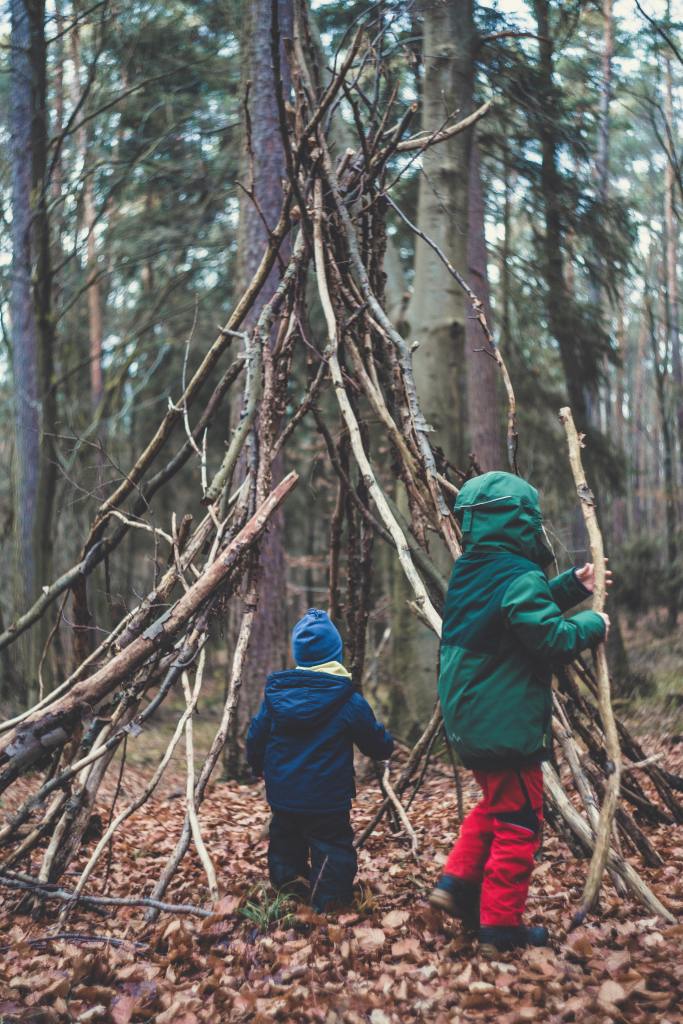
For this activity to work best, you’ll need to be in an area with access to lots of sticks, rocks, leaves, and maybe even the ability to dig (though not strictly necessary). Private property would probably work best, but as long as you clean up after yourselves, public land would also work!
The object of this activity is to create a structure that closely resembles the home of a given land animal from your area. Bears, foxes, eagles, chickadees, snakes, rabbits, lizards, beavers, and even spiders can be used for this activity.
Bring large picture books outside with you for reference (or have some kind of phone or tablet with pre-sourced images so you don’t waste time searching). This is an excellent enrichment activity to cap off a study of animal habitats, or can be used as a hook to kick off such a unit. If the land you’re building on is your own,
If you have multiple kids or are doing this as part of a group, I find it’s fun to have all the kids draw animal names from a hat. At the end, the children can present their shelter and the others have to guess what animal would live there!
- Animal biology
- Art (sculptures)
- English/language arts (informational texts & research)
- Physical education
I hope that got you itching to grab your kids and hit the great outdoors. (Not literally itching, though. Stay away from that poison ivy!)
Now that you’ve finished this list, why not check out PART TWO if you want more STEM, art, and writing activities!
For further reading on this topic:
- 25 Outdoor Winter Activities
- Help My Child Focus Naturally: 5 Tried and True Strategies for Home
- Backyard Natural Playground: A Space for Experimentation & Play
- 50+ Books about Nature for Kids

Hillary is a former teacher who went rogue and became a freelance writer. When not offering support and advice to homeschooling families, she tends to her own garden, family, and cat. You can connect with her on her website, homegrownhillary.com .
Discover more from The Homeschool Resource Room
Subscribe now to keep reading and get access to the full archive.
Continue reading

IMAGES
VIDEO
COMMENTS
*Click the link below the picture for full activity description.* This simple alphabet activity can be done just about anywhere, at any time. It is a great way for kids to practice letter formation and have fun in nature…
Taking your class into the great outdoors? Here is a longlist of 57 outdoor learning activity …
Combine outdoor adventures with creativity, offering a fun way to keep both young children and teens active and engaged. From outdoor yoga to rock painting, these activities are perfect for incorporating physical education …
This list of 40 outdoor activities for kids will help you find outdoor learning activities to enhance your students’ and kiddos’ experiences. So, use these examples for some outdoor playtime with your elementary-aged kids and …
In this blog post, we’ll explore 10 of my favorite fun and educational outdoor learning activities for homeschool that you can incorporate to connect with nature and enhance the learning experiences of your students.
Outdoor learning activities for children to connect learn in nature, suited for home-school parents, classroom teachers, forest school, environmental educators, and nature lovers.
From more outdoor learning activities for all the seasons to nature based art, math and science experiences, you can keep kids busy and learning for months! Take learning outside and enjoy all that fall has to offer with this …
If you are looking for some outdoor play inspiration, we have 12 exciting outdoor STEM activities for you and your kids to try! Find creative science experiments, challenges, and hands-on projects that will get your kids …
These 50 outdoor learning activities provide a diverse range of options to integrate nature into your curriculum, fostering a love for learning and the environment among students. Embrace the outdoors as a classroom and …
Without further ado, here are ten favorite educational outdoor activities! Educational Outdoor Activities #1-5: Using a nature box. Take a small container outside with you.